- Home
- Carolyn Keene
The Clue in the Crumbling Wall Page 3
The Clue in the Crumbling Wall Read online
Page 3
“Oh, come on!” Nancy laughed, taking her friend firmly by the arm. “It’s only a name. Besides, the walk may lead to something interesting.”
Spreading lilac bushes canopied the trail. Their branches caught at Nancy’s hair and clutched at her clothing. Impatiently she pushed them aside and held back the branches for her friends to pass beneath.
“I wish we’d gone some other way,” Bess complained. “This is no fun.”
“I think it is,” Nancy replied. “It’s mysterious here! It’s so—”
Her voice trailed away suddenly. George and Bess glanced at her quickly. Nancy was staring directly toward a giant evergreen.
“What is it?” Bess demanded fearfully.
“Nothing.”
“You didn’t act as if it were nothing,” George said to Nancy.
“I thought I saw something, but I must have been mistaken.”
Despite their coaxing, Nancy would not reveal what had startled her. For an instant she thought a pair of penetrating, human eyes had been staring at the girls from behind the evergreen. Then they had blinked shut and vanished.
“It must have been my imagination,” Nancy told herself.
She walked on hurriedly. As Bess and George sensed her thoughts, they drew closer to the young detective. Nancy rounded the evergreen and saw that it partially hid a vine-covered, decaying summerhouse.
The building was empty, but her eye quickly caught a slight quivering of the vines beside the doorway, although there was no wind. She stopped short, struck by the realization that someone had been lurking there! Quietly she told the others.
“I knew we shouldn’t have chosen this walk,” Bess muttered. “It is haunted.”
“Haunted by a human being,” Nancy said grimly. “I wish I knew who was spying on us!”
There was no sign of anyone now. The girls heard neither the rustle of leaves nor the sound of retreating footsteps.
“Let’s go back to the car,” Bess proposed suddenly. “We’ve seen enough of this place.”
“I haven’t,” Nancy said. “I’m getting more curious every minute.”
Not far from the summerhouse was a stone wall. It occurred to Nancy that the person who had observed them might have scrambled over it to avoid detection. She announced her intention of climbing up to make sure.
While Bess and George watched uneasily, Nancy began to scale the vine-covered wall. Near the top, however, she lost her footing. With a suppressed cry, she fell backward!
George and Bess helped Nancy to her feet. Although uninjured, she was visibly shaken.
“I guess I’d better not try that again,” she said ruefully.
“Those are the most sensible words I’ve heard you say today!” Bess declared. “Let’s get out of here before we find ourselves in real trouble.”
“I’m with you,” George said. “I have an appointment in town, and anyway, it may rain.”
Nancy was reluctant to leave the estate without exploring the castle, but she had noticed that clouds were darkening the sky.
“All right,” she agreed. “But we’ll come back!”
The girls retraced their way across the bridge. From that point on, however, they could not find the right direction to the road.
“We’re probably a long way from the car,” George said finally. “I’ll climb a tree and see if I can spot it.”
Nimble as a monkey, she went high among the branches. Then she shouted down that the river was close by and the road far away.
“We’ve wandered a great distance from where we started,” George reported as she slid down the tree and pointed out the route. “We must cut straight through that woods ahead.”
“Are you sure we won’t get hopelessly lost?” Bess asked.
“Just follow me.”
Nancy and Bess were quite willing to have George lead the way. She pushed ahead confidently, tramping down the high grass and thrusting aside thorny bushes. But as the going became more difficult, her pace slackened.
“It seems to me we’re moving in a wide circle,” Nancy said at last.
George paused to catch her breath. Her gloomy silence confirmed Nancy’s suspicion.
“George, are we lost?” she asked.
“I don’t know about you,” the girl answered ruefully. “Myself—yes.”
“It’s going to rain any minute, too,” Bess said, sinking down on a mossy log. “Oh, why did we come to this horrible, gloomy place? Imagine anyone building a home here!”
“If the roads were opened and some shrubs cut down, the estate would be very lovely,” Nancy pointed out.
After resting for a few minutes the girls decided to continue their trek. Nancy proved a better pathfinder than George and before long they came to recently trampled grass.
“Now I know where we are!” Nancy exclaimed jubilantly. “We’re near the front boundary wall.”
A few hundred feet farther on they saw the wall itself and scrambled over it. The trio reached the shelter of the car just as the first raindrops splashed against the windshield. Fortunately Nancy was able to drive to the paved highway before the side road became a mire of mud.
She dropped the cousins at their houses, then went home. Over a late lunch of milk and a sandwich, she thought about the mystery.
“I might get some kind of a lead from Walter Heath’s will,” she decided, “and I’d like to find out where Juliana did her banking. There might be a clue in the last withdrawals.”
Nancy called Lieutenant Masters. “The police couldn’t locate any bank accounts,” the officer told her. “A very large sum of money was found in Juliana’s apartment in New York. But she had several bills from stores, and by the time they were paid from this cash, there was nothing left.”
“Then that’s a dead end,” said Nancy. “How about the will?”
“I don’t know,” said the officer. She agreed to meet Nancy the next morning at the courthouse to examine the document. Daniel Hector was named as sole executor.
A quick reading confirmed what Mrs. Fenimore had told her. The entire Heath estate had been bequeathed to Juliana Johnson on the condition that she claim it within five years of Walter Heath’s death.
One clause in the will held Nancy’s attention. It read:
“It is my belief and hope that Juliana still lives and will claim the property within the allotted time. She will be able to identify herself in a special way, thus insuring that no impostor can receive my estate.”
“I wonder what that means,” Nancy mused.
“I haven’t any idea,” Lieutenant Masters said.
They went over the document again, but it gave no clue to the way in which Juliana might establish her identity.
“I must find out what Mr. Heath meant by this,” said Nancy. “Obviously it’s a very important clue!”
CHAPTER V
Suspicious Figures
NANCY suggested to Lieutenant Masters that they go at once to see Mrs. Fenimore. “She may know by what special means Walter Heath expected Juliana to identify herself.”
The young officer agreed. She and Nancy drove to the Fenimore house in their own cars. They found the woman seated in the living room.
“Good morning,” Mrs. Fenimore, who seemed to be feeling better, greeted the visitors warmly. She stared anxiously at the policewoman. “It’s—it’s not Joan again?”
“No. In fact, my two rosebushes have been returned. We came to ask you a few more questions about your sister,” Nancy replied.
The woman relaxed but spoke wearily. “I’ll tell you everything I can. A couple of years ago I gave up hope that she would be found, but I’ve never told Joan this.”
“Then you believe that your sister may not be living?” Nancy asked soberly.
“Oh no. I’m sure Julie is alive,” Mrs. Fenimore replied, “but I’m afraid she may have disappeared for good, and I’ll never see her again.”
“Would you give us some personal information about your sister?” Lieutenant Mast
ers asked kindly. “Was she younger than you?”
“No. Julie was seven years older. Our parents died when we were children, and we lived with an aunt who was pretty strict. I never minded Aunt Mattie’s scolding, but Julie, who was high strung, resented it. She took dancing lessons secretly, and when Aunt Mattie found out and punished her for it, Julie ran away.
“For several years Julie danced wherever she could get an engagement and studied during her spare moments.”
The policewoman asked, “Did you see Juliana often after she became famous?”
“Only now and then. But she called me every week. I was so excited when she became engaged to Walter Heath. It was to be kept from the press, so of course I told no one.”
“Could anything have happened between Juliana and Mr. Heath to make her unhappy enough to disappear?” Nancy asked.
Mrs. Fenimore shook her head. “Julie was beautiful and talented. He was handsome, wealthy, and kind. They adored each other. I’m sure he had nothing to do with her disappearance.”
Mention of the deceased estate owner reminded Nancy of the real purpose of her calL She asked Mrs. Fenimore about the strange identification clause in the will.
“I wondered myself what that meant when I read it,” the woman replied.
“Do you think Daniel Hector might have an answer?” Nancy asked.
Mrs. Fenimore’s face darkened. “Please don’t mention that man’s name! I detest him. All these years he’s only been pretending to search for Julie.”
“Pretending?”
“Once in a while he would call to tell me about his attempts to find her but they sounded half-hearted. Now he doesn’t even phone. I’m sure he’s stopped trying. I’m counting on you, Nancy, to solve the mystery.”
Nancy promised to do everything she could to trace the missing dancer. Secretly she wondered if she could find the woman in time to save the inheritance for her.
“May I see a photograph of your sister?” she requested.
“I have a number of excellent ones,” Mrs. Fenimore replied. “I’ll give you one. They’re in the drawer of this table.”
She took them out. There were six, taken years before when the dancer was at the height of her career. Several were inscribed with her name and a greeting. The face was a distinctive one. Carefully Nancy noted the perfect features, the beautiful dark eyes, the straight nose and firm chin.
“Julie may have changed a great deal since I last saw her,” Mrs. Fenimore remarked. “Ten years have gone by.”
“Your sister is lovely,” Nancy commented. “Joan looks a little like her.”
“Yes, she does. And certainly my daughter has Julie’s vivacious ways. She’s quite a little actress. Maybe someday—”
Mrs. Fenimore looked sadly into space. Lieutenant Masters, fearing the conversation had upset the woman, said they must leave.
“Please try not to worry,” Nancy urged Mrs. Fenimore who handed her a photograph as they said good-by.
When she and the officer reached their cars, Nancy thanked Lieutenant Masters for her help.
“Call on me any time,” the young woman said as she drove off.
Nancy decided to take a walk and think about the case.
As she wandered up the street, children were coming home from school to lunch. She saw Joan playing with an older boy in a vacant lot. They were tossing a ball for a dog to retrieve.
“That boy looks familiar,” Nancy thought as she walked over to the children. Suddenly, in a fit of temper, the boy hit the dog with a stick.
“Cut it out!” he shouted. “You’re chewing my ball to pieces!”
Joan screamed.
“Stop that!” Nancy ordered. “The dog hasn’t hurt your ball. He was only playing.”
The boy gazed at her with hard, unfriendly eyes. “Is he your dog?” he asked impudently.
“No.”
“Then it’s none of your business if I hit him.”
Nancy started to reply, but it was not necessary. The dog dropped the ball and slunk off. The boy picked it up. Then, giving Nancy a baleful look, he ran away.
Nancy took Joan by the hand and led her off. As tactfully as possible she suggested that the child ought to find a girl playmate.
“Teddy Hooper’s okay. He’s the only one that lives close to me,” Joan replied, skipping happily along beside her companion. “I don’t like him when he’s mean, but most of the time he’s a lot of fun. He always thinks up exciting things to do.”
“You’d better hurry home to lunch,” Nancy said. “I’ll go with you. My car’s there.”
When they reached the house, Joan hugged Nancy, then ran inside. Nancy was sure she had made a firm friend of the little girl.
“I’m not far from Salty’s,” the young detective said to herself. “I’ll drive there and find out if he has seen that man who crashed into our boat.”
“Stop that!” Nancy ordered.
In a little while she came to the clam digger’s home. The sailor was on the shore repairing his rowboat.
“Well, now, me lass, I’m glad to see you,” he said. “But I’m afraid I haven’t got good news.”
“You mean about the boat?”
“I’ve looked high an’ low for that damaged boat,” the man said regretfully. “It’s not tied up anywhere along here.”
“How about Harper’s Inlet?” Nancy asked.
Salty admitted he had not been there. “Too busy,” he explained. “Maybe I’ll go this afternoon. I need a mess o’ clams an’ there be some up the inlet. You want to come along? I’ll show you the Heath factory.”
For Nancy the opportunity was too good to pass up. She was eager to visit the spot.
“Just tell me when to be here,” she said.
After settling on three o’clock, she remarked, “I’ll bring along one of my friends.”
Nancy hurried home for a quick lunch, then telephoned George. Promptly at three o’clock the two girls met Salty at the waterfront.
“I’ll put ye to work,” the sailor chuckled as he gathered together his fishing and clamming equipment. “Help me load these into the rowboat, will you?”
The old man’s muscular arms rippled as he dug the oars into the tranquil waters of the Muskoka River. Presently he and his passengers were skimming along at a rapid rate. Behind the craft trailed a long copper wire which gleamed in the sunlight.
“I’m trollin’ for my dinner tonight,” Salty explained. “There’s somethin’ yankin’ on my line right now, I do believe!”
He rested the oars and pulled in the line. Finally a four-pound speckled bass flopped into the boat.
“She’s a beauty,” he said, grinning.
While the girls kept the craft from drifting downstream, Salty removed the hook from the fish and dropped his catch into a woven basket. Then he wound up the copper troll line and put it away.
“Fishin’s not much good in the inlet,” he remarked. “But we’ll find clams.”
The upper river was very still. As the boat entered Harper’s Inlet some time later, there was no sound except the occasional chirping of a bird. Nancy hunched low now and then, to avoid the overhanging bushes and watched the coves for a hidden boat. There was none.
“It doesn’t look as if we’re goin’ to find your friend,” Salty remarked after he had rowed a quarter of a mile upstream. “We’re almost to Heath’s button factory now. I’ll anchor here.”
The man had located a bed of clams in the shallow water. He asked the girls to balance his fish basket on the gunwale, then waded in to dig the clams from the mud and sand with his rake. As he tossed them, one by one, he kept singing snatches of familiar sea songs.
“Basket’s full,” Nancy called several minutes later.
Salty got into the boat and started off again. As they rounded a bend, the girls saw a large, square building set some distance back from the shore. The banks nearby were littered with discarded bits of clamshells.
“That’s the Heath button factory,”
Salty said. “She’s sure gone to pieces.”
Nancy gazed curiously at the neglected brick structure. Vines which had grown up the building’s walls lay thick on the shingle roof and all the windows were broken.
Suddenly Nancy spotted two figures near the factory entrance. As they vanished into the building, Salty pointed to an object hidden near some bushes.
“A boat!” he exclaimed. “And her prow’s damaged, too!”
The bow of the boat had been drawn up on the sand. Nancy and George recognized it immediately as the blue-and-white craft that had struck them!
“Oh, Salty, please pull in here!” Nancy begged.
As he did, she told him about the men.
“Humph!” Salty grunted. “I’ll bet ye a mess o’ clams they ain’t got no right in there!”
Nancy nodded. “I want to talk to them. Will you stay here near the damaged boat? If the men come out, try to hold them until we get back.”
The sailor did not like being left out of the search, but before he could protest, the girls were splashing through knee-deep water to shore.
CHAPTER VI
A Mysterious Explosion
NANCY and George had to cross a stretch of low, marshy land in order to reach the old button factory. Their sneakers, already water-soaked, became caked with mud. The girls were grateful for the high wild grass that screened their approach.
“You know,” Nancy said, “those two men looked familiar.”
“Who are they?”
“I’m not sure, but one of them was thin and wore a blue cap like the fellow who crashed into our motorboat. The other resembled Daniel Hector, the lawyer.”
While still twenty yards from the factory, the girls were startled to hear the sound of hammering. The pounding noise came from inside the building.
“I wonder what those men are doing in there,” Nancy said, cautiously pulling aside the tall vines.
“Maybe they’re workmen who were sent to repair the place,” George replied.
Nancy offered no comment. It was possible that Daniel Hector had brought another man to the property either to inspect it, or to do some work. But she seriously doubted this.

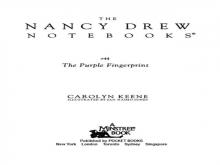 The Purple Fingerprint
The Purple Fingerprint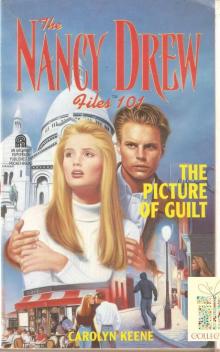 The Picture of Guilt
The Picture of Guilt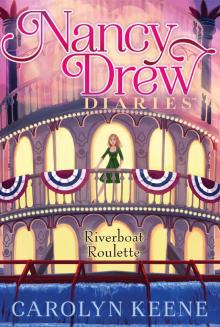 Riverboat Roulette
Riverboat Roulette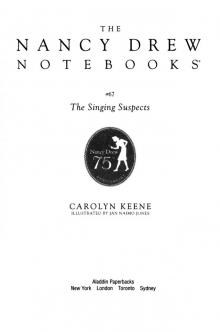 The Singing Suspects
The Singing Suspects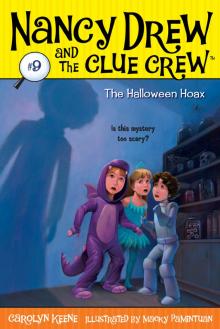 The Halloween Hoax
The Halloween Hoax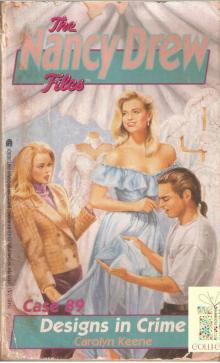 089 Designs in Crime
089 Designs in Crime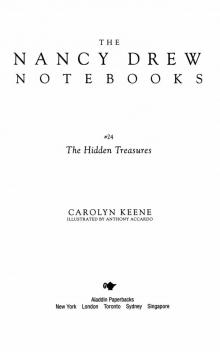 The Hidden Treasures
The Hidden Treasures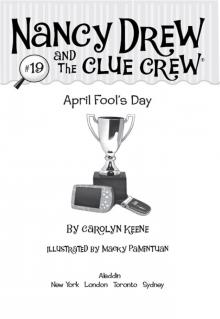 April Fool's Day
April Fool's Day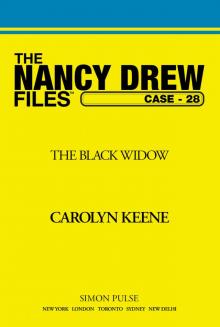 The Black Widow
The Black Widow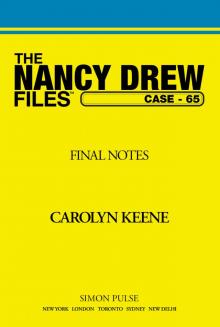 Final Notes
Final Notes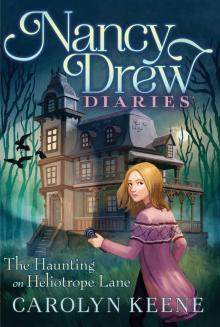 The Haunting on Heliotrope Lane
The Haunting on Heliotrope Lane The Runaway Bride
The Runaway Bride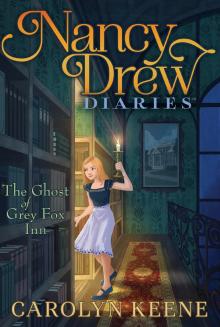 The Ghost of Grey Fox Inn
The Ghost of Grey Fox Inn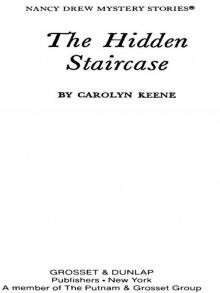 The Hidden Staircase
The Hidden Staircase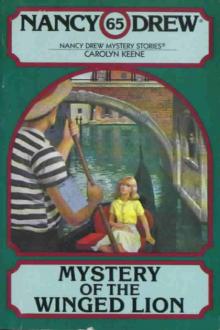 Mystery of the Winged Lion
Mystery of the Winged Lion Over the Edge
Over the Edge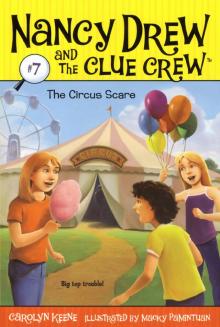 The Circus Scare
The Circus Scare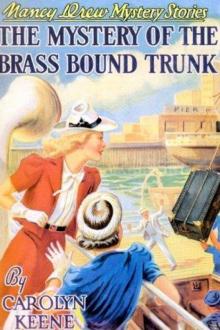 The Mystery of the Brass-Bound Trunk
The Mystery of the Brass-Bound Trunk Ski School Sneak
Ski School Sneak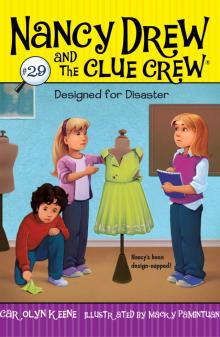 Designed for Disaster
Designed for Disaster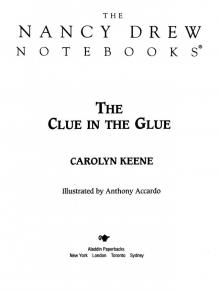 The Clue in the Glue
The Clue in the Glue Cold as Ice
Cold as Ice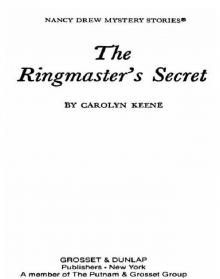 The Ringmaster's Secret
The Ringmaster's Secret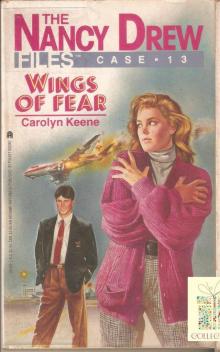 013 Wings of Fear
013 Wings of Fear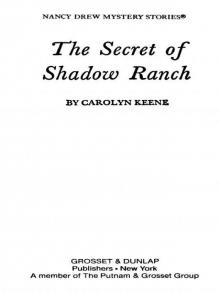 The Secret of Shadow Ranch
The Secret of Shadow Ranch Not Nice on Ice
Not Nice on Ice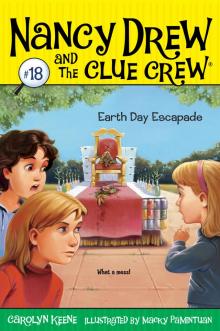 Earth Day Escapade
Earth Day Escapade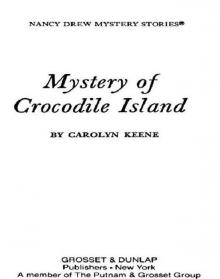 Mystery of Crocodile Island
Mystery of Crocodile Island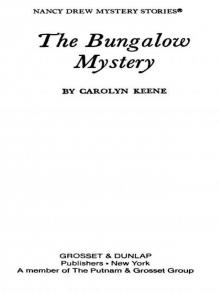 The Bungalow Mystery
The Bungalow Mystery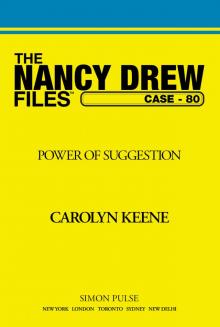 Power of Suggestion
Power of Suggestion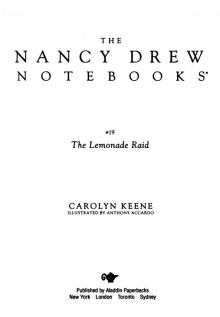 The Lemonade Raid
The Lemonade Raid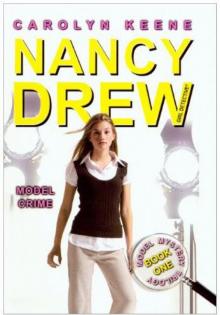 Model Crime
Model Crime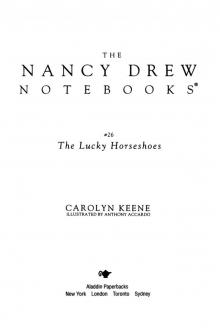 The Lucky Horseshoes
The Lucky Horseshoes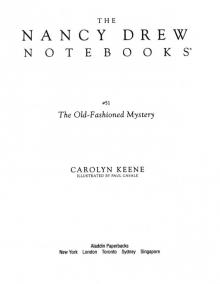 The Secret of the Old Clock
The Secret of the Old Clock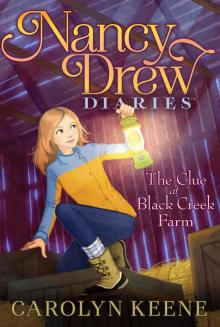 The Clue at Black Creek Farm
The Clue at Black Creek Farm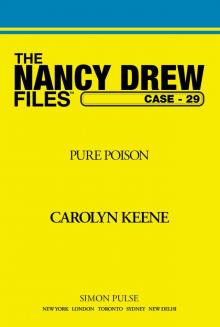 Pure Poison
Pure Poison Nobody's Business
Nobody's Business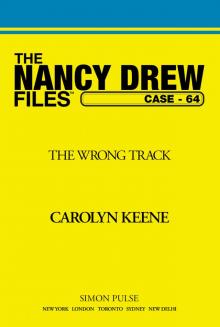 Wrong Track
Wrong Track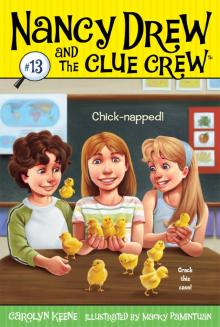 Chick-Napped!
Chick-Napped!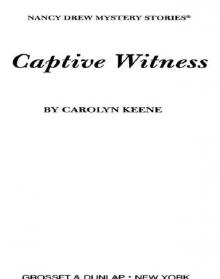 Captive Witness
Captive Witness If Looks Could Kill
If Looks Could Kill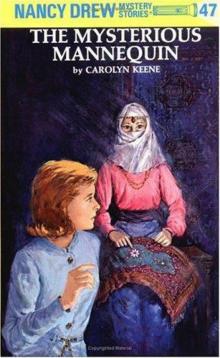 The Mysterious Mannequin
The Mysterious Mannequin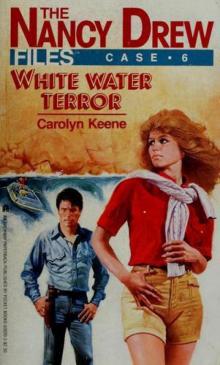 White Water Terror
White Water Terror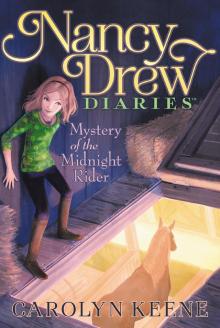 Mystery of the Midnight Rider
Mystery of the Midnight Rider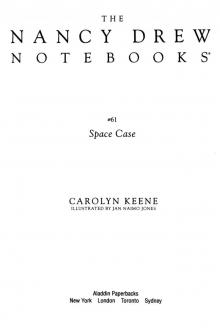 Space Case
Space Case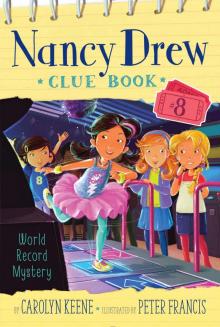 World Record Mystery
World Record Mystery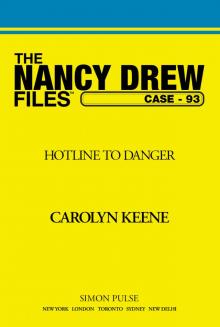 Hotline to Danger
Hotline to Danger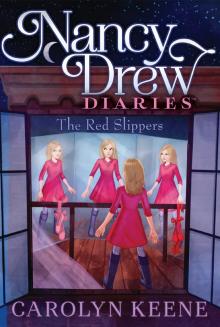 The Red Slippers
The Red Slippers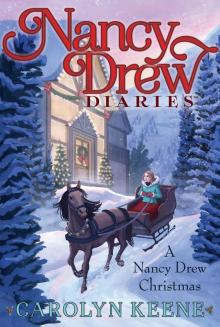 A Crime for Christmas
A Crime for Christmas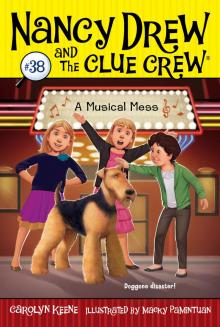 A Musical Mess
A Musical Mess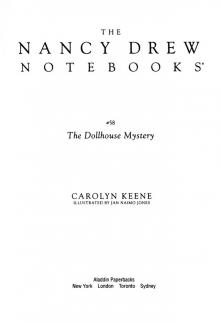 The Dollhouse Mystery
The Dollhouse Mystery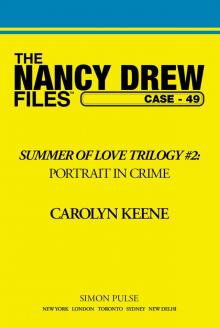 Portrait in Crime
Portrait in Crime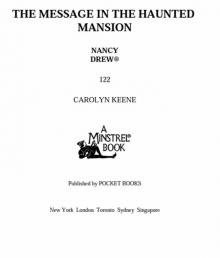 The Message in the Haunted Mansion
The Message in the Haunted Mansion Playing With Fire
Playing With Fire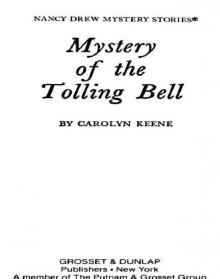 Mystery of the Tolling Bell
Mystery of the Tolling Bell Cutting Edge
Cutting Edge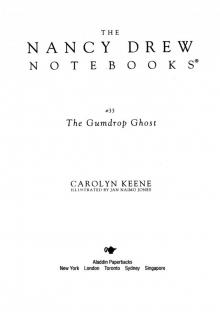 The Gumdrop Ghost
The Gumdrop Ghost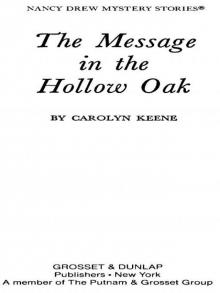 The Message in the Hollow Oak
The Message in the Hollow Oak Trial by Fire
Trial by Fire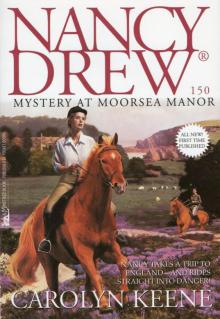 Mystery at Moorsea Manor
Mystery at Moorsea Manor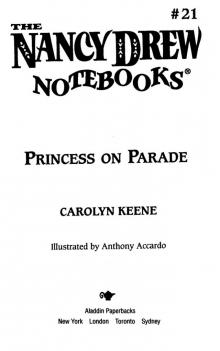 Princess on Parade
Princess on Parade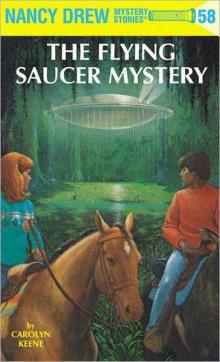 The Flying Saucer Mystery
The Flying Saucer Mystery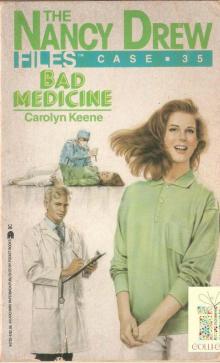 035 Bad Medicine
035 Bad Medicine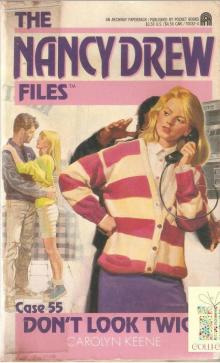 055 Don't Look Twice
055 Don't Look Twice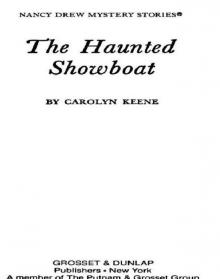 The Haunted Showboat
The Haunted Showboat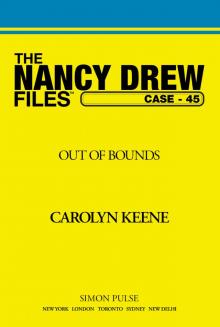 Out of Bounds
Out of Bounds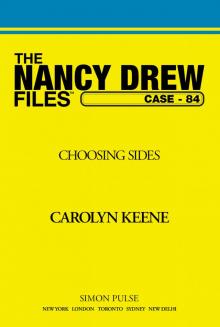 Choosing Sides
Choosing Sides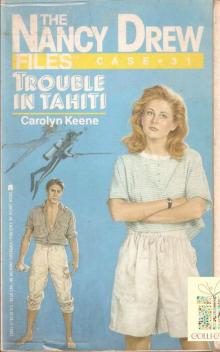 031 Trouble in Tahiti
031 Trouble in Tahiti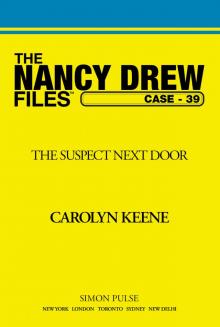 The Suspect Next Door
The Suspect Next Door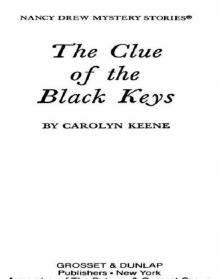 The Clue of the Black Keys
The Clue of the Black Keys The Secret Santa
The Secret Santa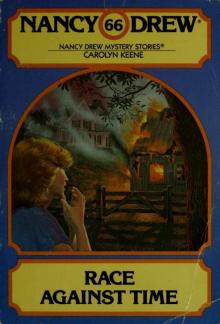 Race Against Time
Race Against Time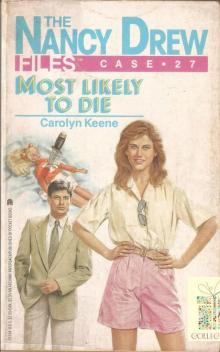 027 Most Likely to Die
027 Most Likely to Die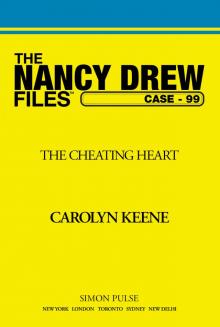 The Cheating Heart
The Cheating Heart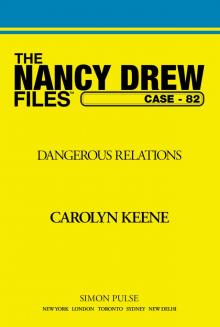 Dangerous Relations
Dangerous Relations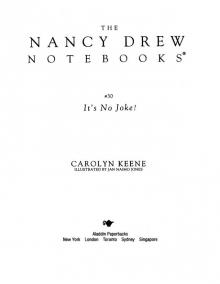 It's No Joke!
It's No Joke!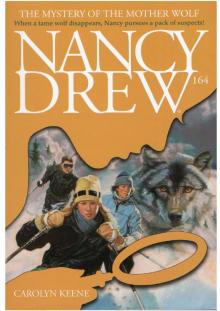 The Mystery of the Mother Wolf
The Mystery of the Mother Wolf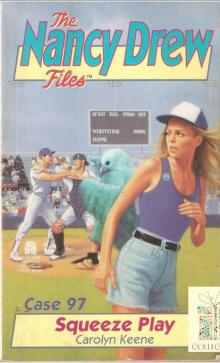 097 Squeeze Play
097 Squeeze Play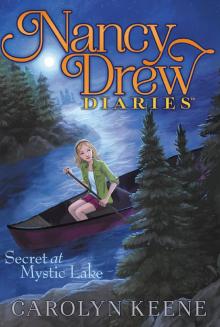 Secret at Mystic Lake
Secret at Mystic Lake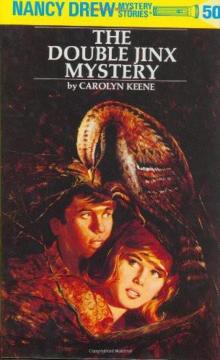 The Double Jinx Mystery
The Double Jinx Mystery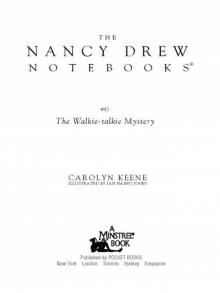 The Walkie Talkie Mystery
The Walkie Talkie Mystery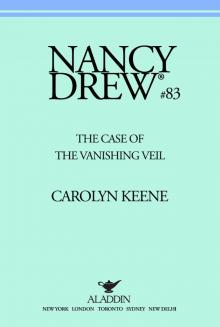 The Case of the Vanishing Veil
The Case of the Vanishing Veil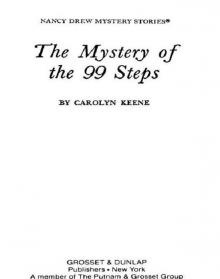 The Mystery of the 99 Steps
The Mystery of the 99 Steps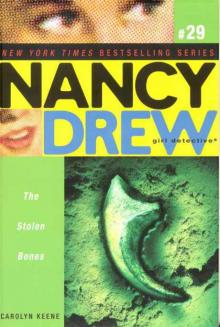 The Stolen Bones
The Stolen Bones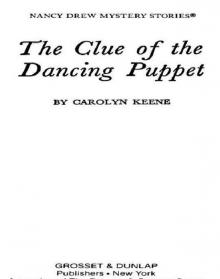 The Clue of the Dancing Puppet
The Clue of the Dancing Puppet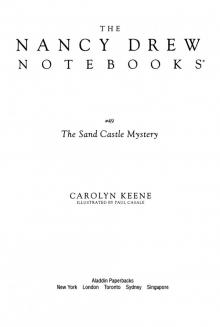 The Sand Castle Mystery
The Sand Castle Mystery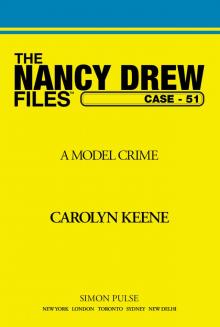 A Model Crime
A Model Crime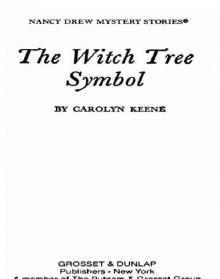 The Witch Tree Symbol
The Witch Tree Symbol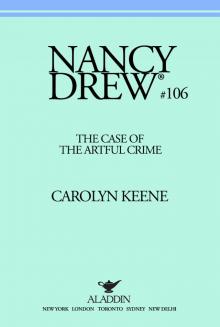 The Case of the Artful Crime
The Case of the Artful Crime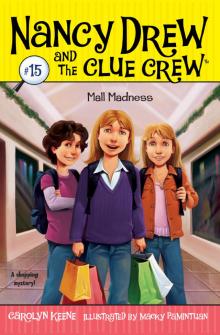 Mall Madness
Mall Madness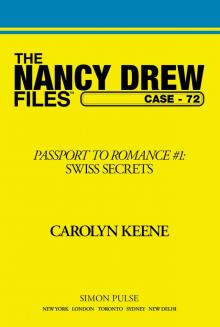 Swiss Secrets
Swiss Secrets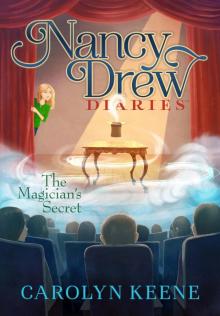 The Magician's Secret
The Magician's Secret Tall, Dark and Deadly
Tall, Dark and Deadly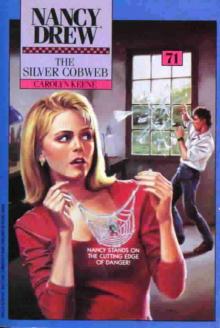 The Silver Cobweb
The Silver Cobweb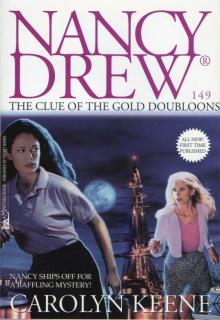 The Clue of the Gold Doubloons
The Clue of the Gold Doubloons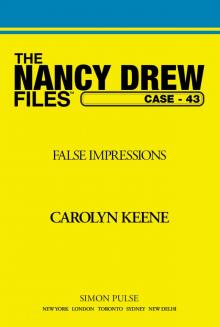 False Impressions
False Impressions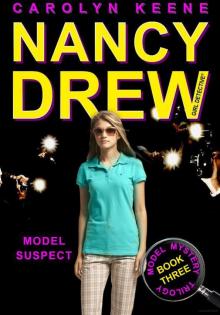 Model Suspect
Model Suspect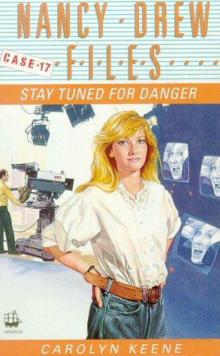 Stay Tuned for Danger
Stay Tuned for Danger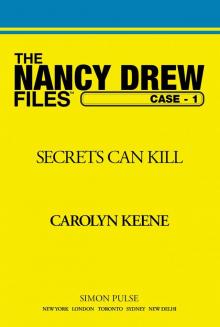 Secrets Can Kill
Secrets Can Kill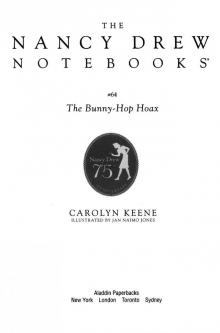 The Bunny-Hop Hoax
The Bunny-Hop Hoax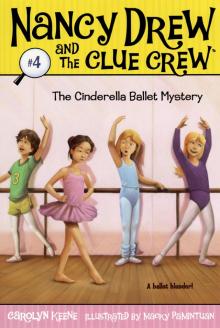 The Cinderella Ballet Mystery
The Cinderella Ballet Mystery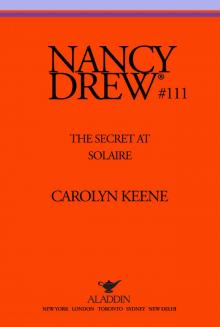 The Secret at Solaire
The Secret at Solaire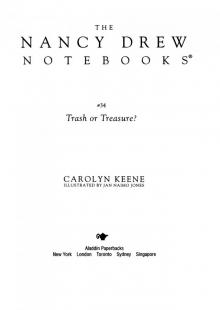 Trash or Treasure?
Trash or Treasure?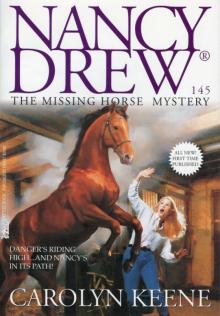 The Missing Horse Mystery
The Missing Horse Mystery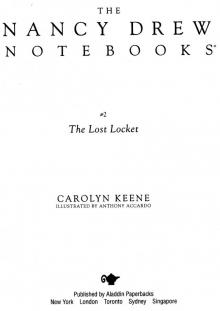 The Lost Locket
The Lost Locket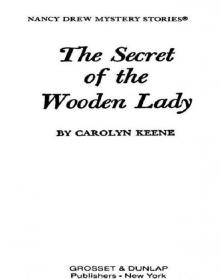 The Secret of the Wooden Lady
The Secret of the Wooden Lady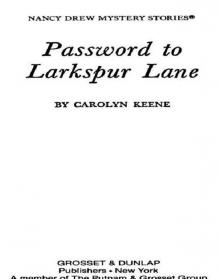 Password to Larkspur Lane
Password to Larkspur Lane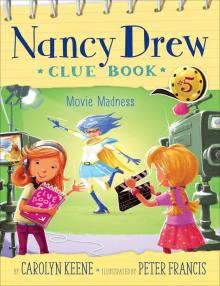 Movie Madness
Movie Madness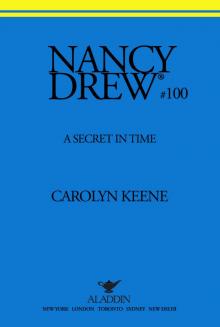 A Secret in Time
A Secret in Time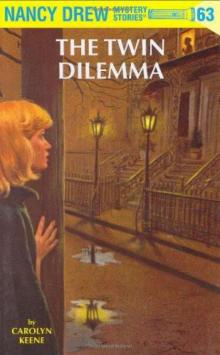 The Twin Dilemma
The Twin Dilemma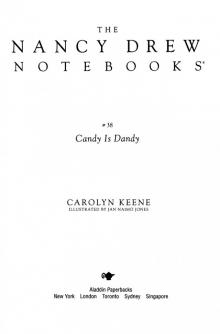 Candy Is Dandy
Candy Is Dandy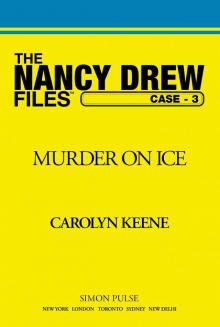 Murder on Ice
Murder on Ice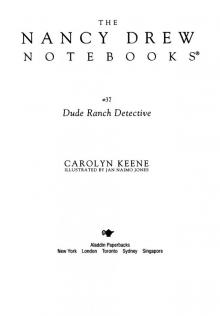 Dude Ranch Detective
Dude Ranch Detective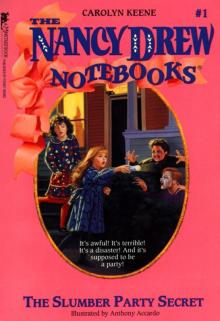 The Slumber Party Secret
The Slumber Party Secret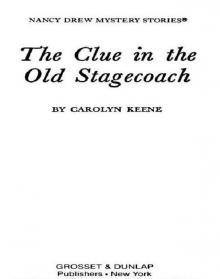 The Clue in the Old Stagecoach
The Clue in the Old Stagecoach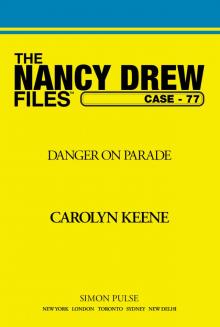 Danger on Parade
Danger on Parade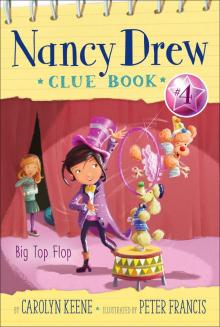 Big Top Flop
Big Top Flop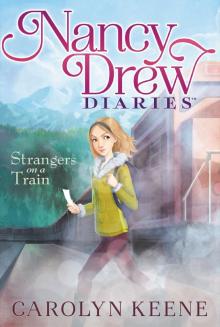 Strangers on a Train
Strangers on a Train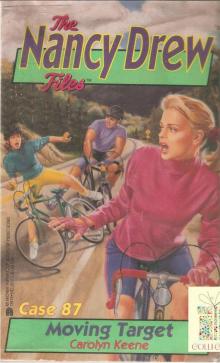 087 Moving Target
087 Moving Target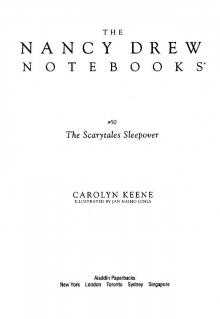 The Scarytales Sleepover
The Scarytales Sleepover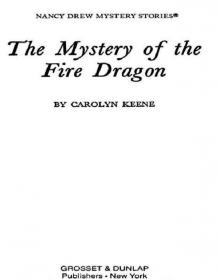 The Mystery of the Fire Dragon
The Mystery of the Fire Dragon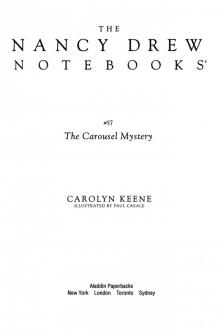 The Carousel Mystery
The Carousel Mystery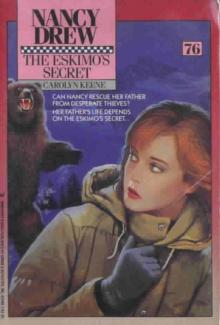 The Eskimo's Secret
The Eskimo's Secret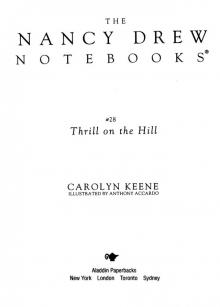 Thrill on the Hill
Thrill on the Hill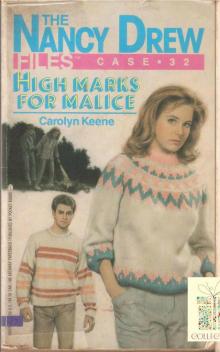 032 High Marks for Malice
032 High Marks for Malice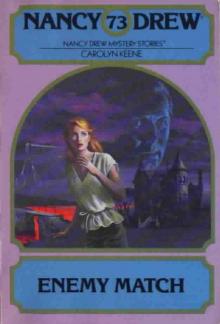 Enemy Match
Enemy Match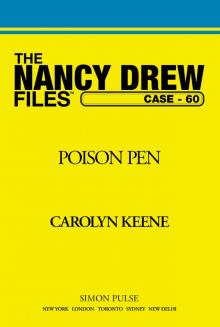 Poison Pen
Poison Pen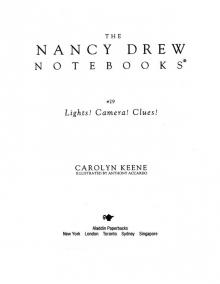 Lights, Camera . . . Cats!
Lights, Camera . . . Cats!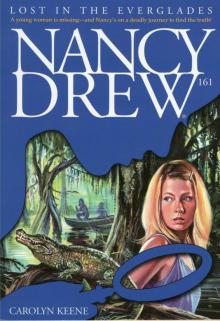 Lost in the Everglades
Lost in the Everglades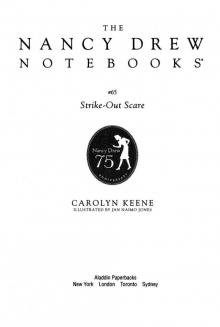 Strike-Out Scare
Strike-Out Scare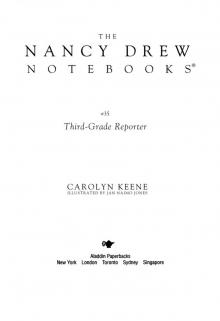 Third-Grade Reporter
Third-Grade Reporter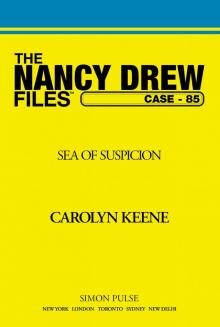 Sea of Suspicion
Sea of Suspicion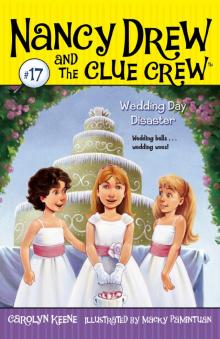 Wedding Day Disaster
Wedding Day Disaster The Make-A-Pet Mystery
The Make-A-Pet Mystery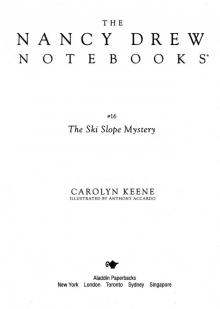 The Ski Slope Mystery
The Ski Slope Mystery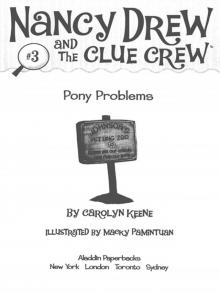 Pony Problems
Pony Problems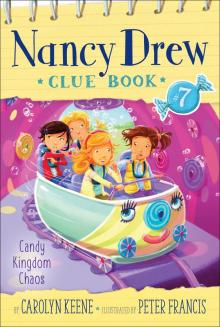 Candy Kingdom Chaos
Candy Kingdom Chaos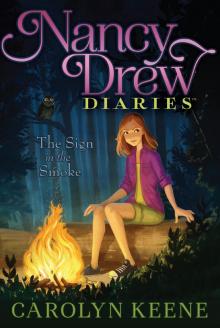 The Sign in the Smoke
The Sign in the Smoke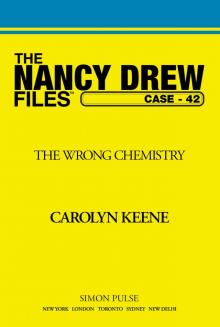 The Wrong Chemistry
The Wrong Chemistry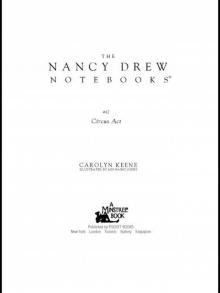 Circus Act
Circus Act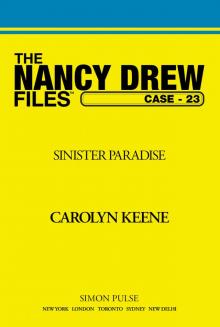 Sinister Paradise
Sinister Paradise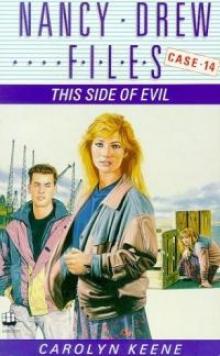 This Side of Evil
This Side of Evil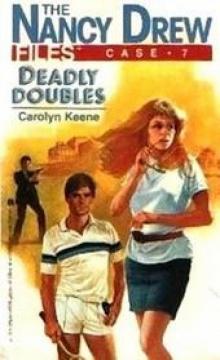 Deadly Doubles
Deadly Doubles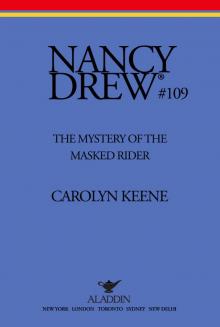 The Mystery of the Masked Rider
The Mystery of the Masked Rider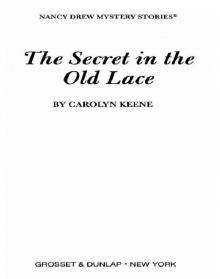 The Secret in the Old Lace
The Secret in the Old Lace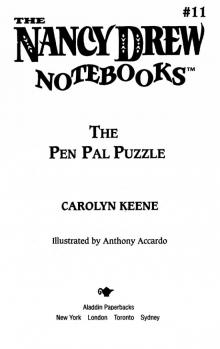 The Pen Pal Puzzle
The Pen Pal Puzzle Without a Trace
Without a Trace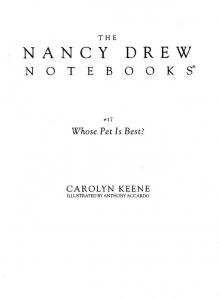 Whose Pet Is Best?
Whose Pet Is Best?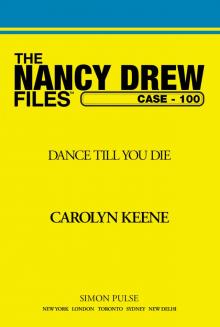 Dance Till You Die
Dance Till You Die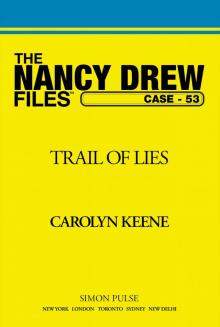 Trail of Lies
Trail of Lies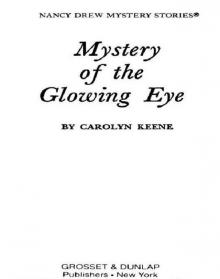 Mystery of the Glowing Eye
Mystery of the Glowing Eye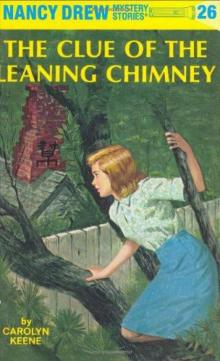 The Clue of the Leaning Chimney
The Clue of the Leaning Chimney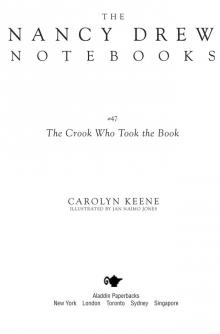 The Crook Who Took the Book
The Crook Who Took the Book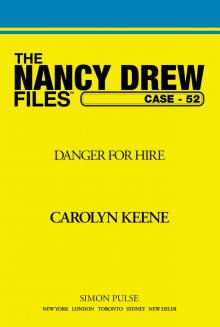 Danger for Hire
Danger for Hire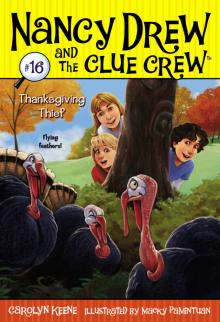 Thanksgiving Thief
Thanksgiving Thief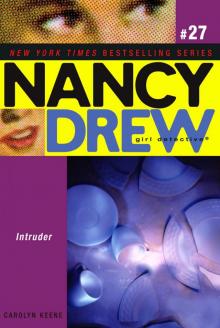 Intruder!
Intruder!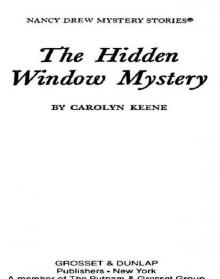 The Hidden Window Mystery
The Hidden Window Mystery Win, Place or Die
Win, Place or Die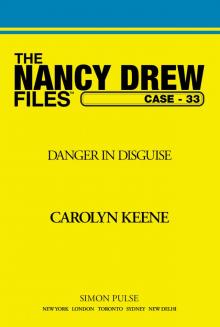 Danger in Disguise
Danger in Disguise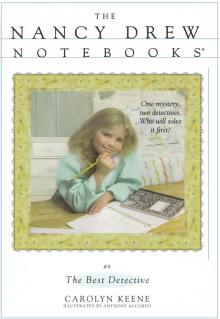 The Best Detective
The Best Detective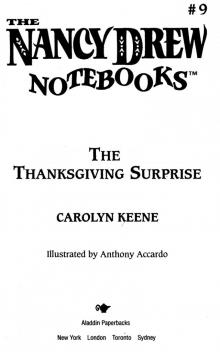 The Thanksgiving Surprise
The Thanksgiving Surprise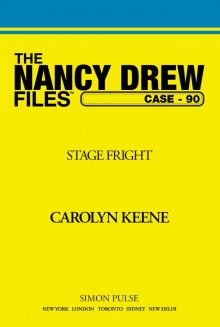 Stage Fright
Stage Fright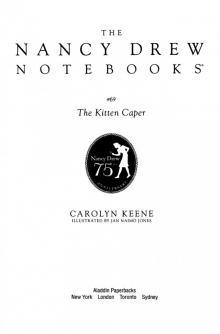 The Kitten Caper
The Kitten Caper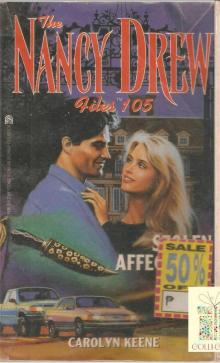 Stolen Affections
Stolen Affections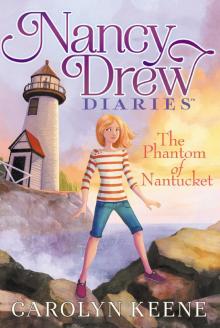 The Phantom of Nantucket
The Phantom of Nantucket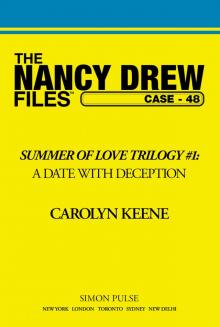 Date With Deception
Date With Deception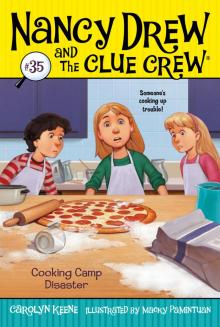 Cooking Camp Disaster
Cooking Camp Disaster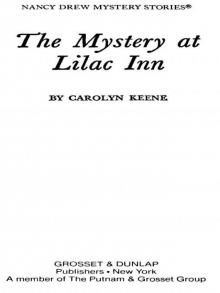 The Mystery at Lilac Inn
The Mystery at Lilac Inn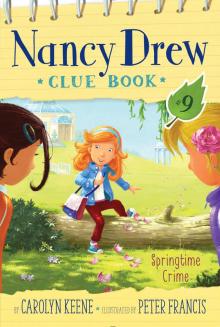 Springtime Crime
Springtime Crime Action!
Action! Into Thin Air
Into Thin Air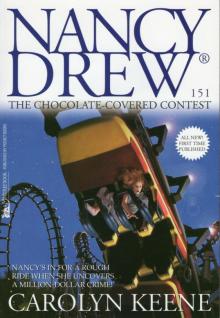 The Chocolate-Covered Contest
The Chocolate-Covered Contest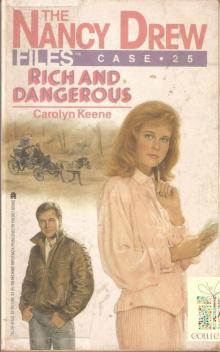 025 Rich and Dangerous
025 Rich and Dangerous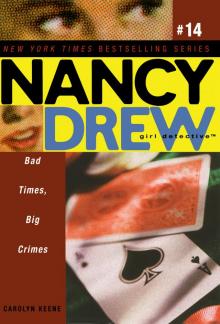 Bad Times, Big Crimes
Bad Times, Big Crimes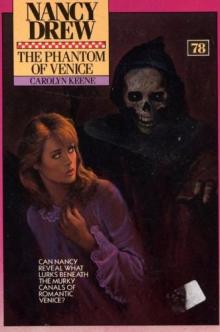 078 The Phantom Of Venice
078 The Phantom Of Venice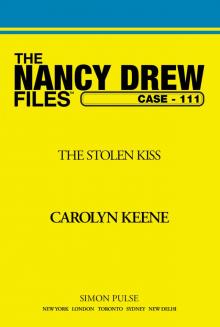 The Stolen Kiss
The Stolen Kiss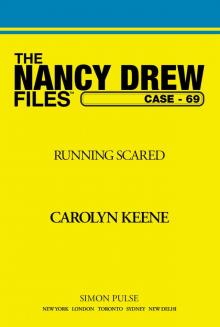 Running Scared
Running Scared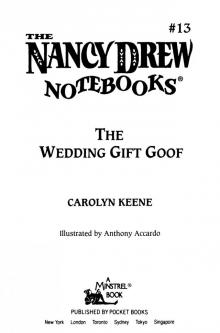 The Wedding Gift Goof
The Wedding Gift Goof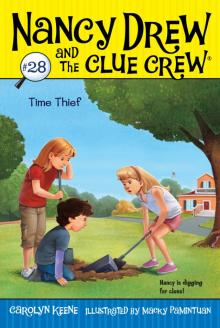 Time Thief
Time Thief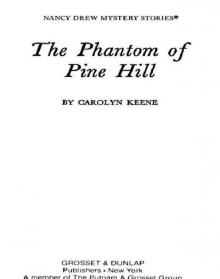 The Phantom of Pine Hill
The Phantom of Pine Hill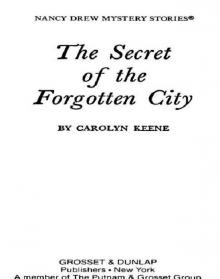 The Secret of the Forgotten City
The Secret of the Forgotten City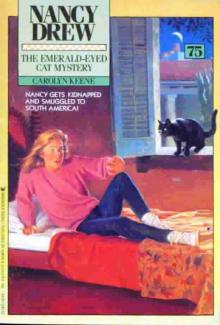 The Emerald-Eyed Cat Mystery
The Emerald-Eyed Cat Mystery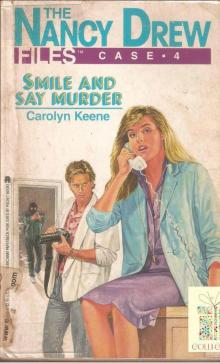 004 Smile and Say Murder
004 Smile and Say Murder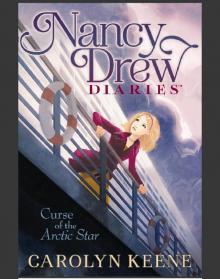 Curse of the Arctic Star
Curse of the Arctic Star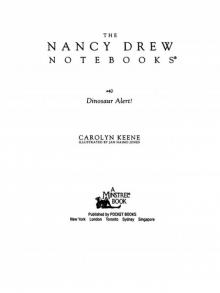 Dinosaur Alert!
Dinosaur Alert!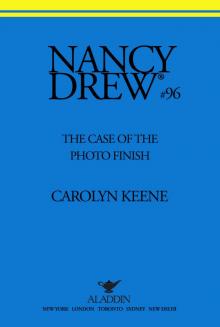 The Case of the Photo Finish
The Case of the Photo Finish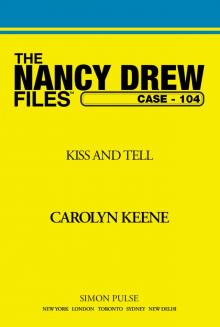 Kiss and Tell
Kiss and Tell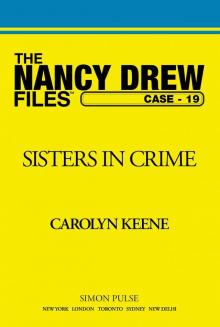 Sisters in Crime
Sisters in Crime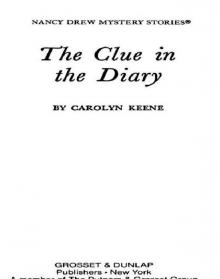 The Clue in the Diary
The Clue in the Diary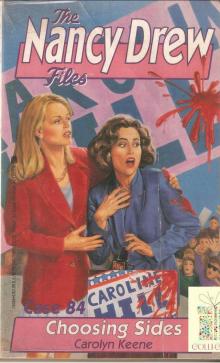 084 Choosing Sides
084 Choosing Sides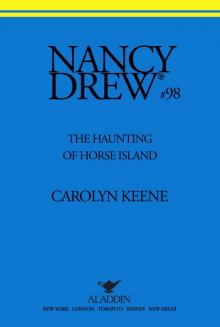 Haunting of Horse Island
Haunting of Horse Island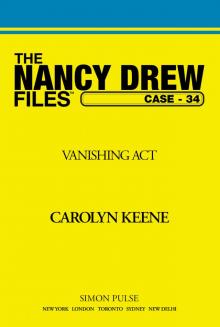 Vanishing Act
Vanishing Act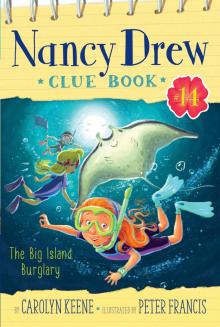 The Big Island Burglary
The Big Island Burglary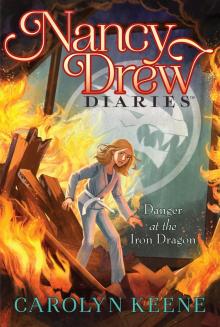 Danger at the Iron Dragon
Danger at the Iron Dragon Pets on Parade
Pets on Parade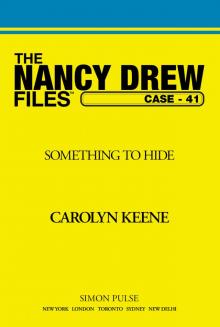 Something to Hide
Something to Hide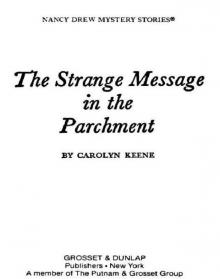 The Strange Message in the Parchment
The Strange Message in the Parchment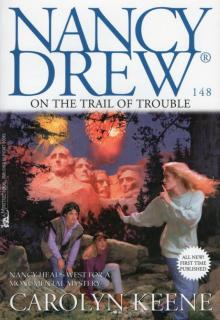 On the Trail of Trouble
On the Trail of Trouble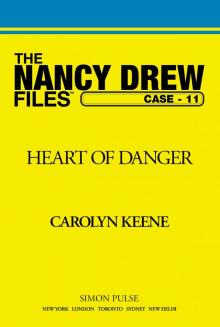 Heart of Danger
Heart of Danger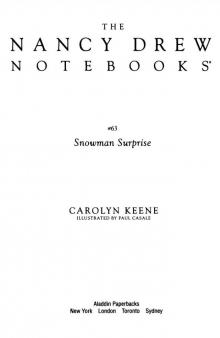 The Snowman Surprise
The Snowman Surprise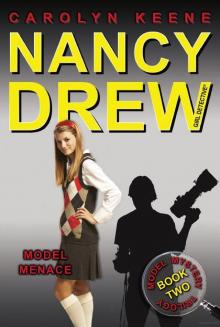 Model Menace
Model Menace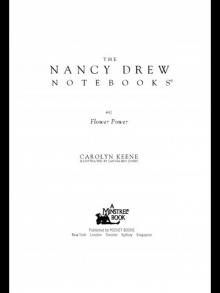 Flower Power
Flower Power The Great Goat Gaffe
The Great Goat Gaffe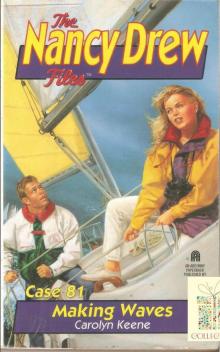 081 Making Waves
081 Making Waves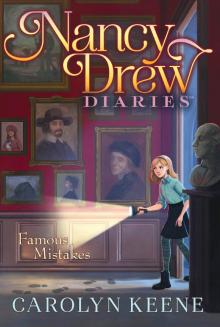 Famous Mistakes
Famous Mistakes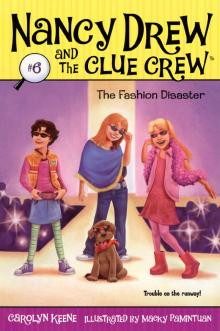 The Fashion Disaster
The Fashion Disaster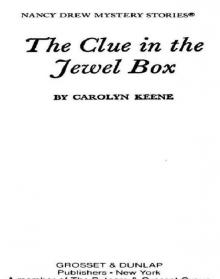 The Clue in the Jewel Box
The Clue in the Jewel Box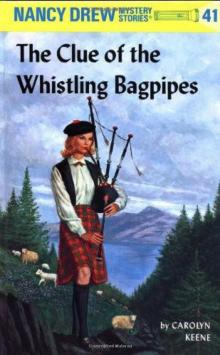 The Clue of the Whistling Bagpipes
The Clue of the Whistling Bagpipes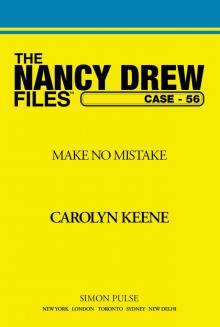 Make No Mistake
Make No Mistake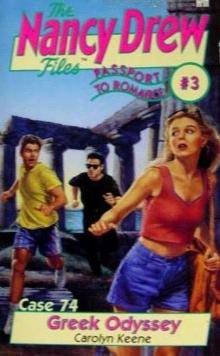 Greek Odyssey
Greek Odyssey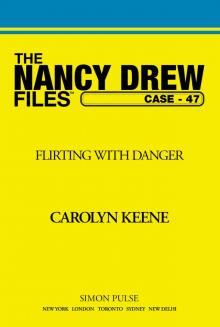 Flirting With Danger
Flirting With Danger Double Take
Double Take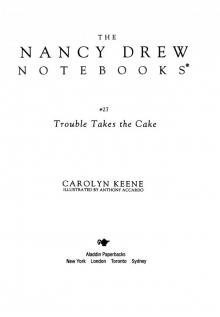 Trouble Takes the Cake
Trouble Takes the Cake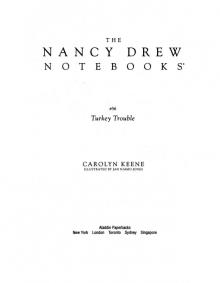 Turkey Trouble
Turkey Trouble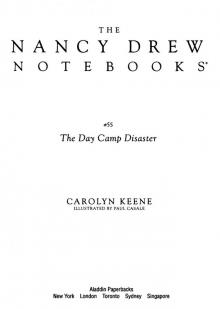 The Day Camp Disaster
The Day Camp Disaster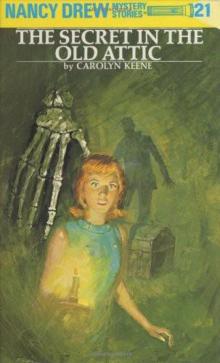 The Secret in the Old Attic
The Secret in the Old Attic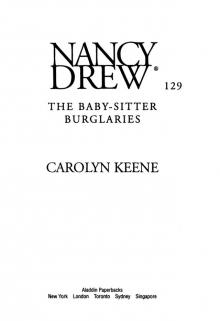 The Baby-Sitter Burglaries
The Baby-Sitter Burglaries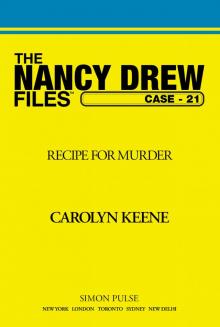 Recipe for Murder
Recipe for Murder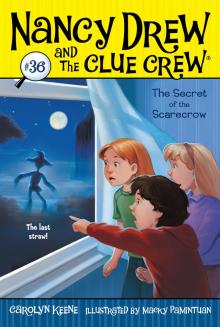 The Secret of the Scarecrow
The Secret of the Scarecrow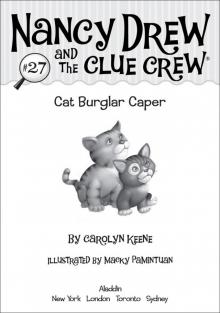 Cat Burglar Caper
Cat Burglar Caper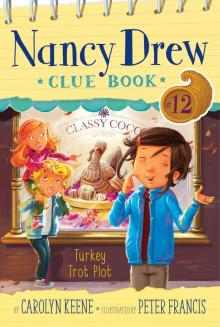 Turkey Trot Plot
Turkey Trot Plot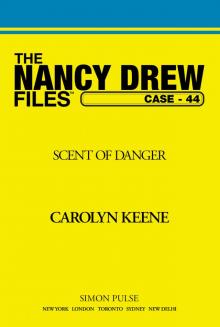 Scent of Danger
Scent of Danger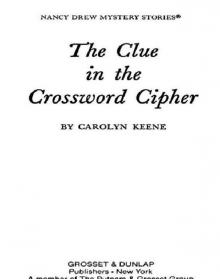 The Clue in the Crossword Cipher
The Clue in the Crossword Cipher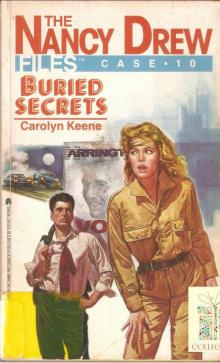 010 Buried Secrets
010 Buried Secrets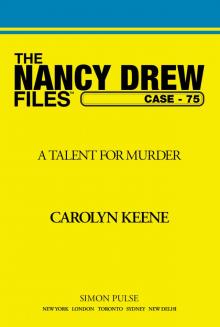 A Talent for Murder
A Talent for Murder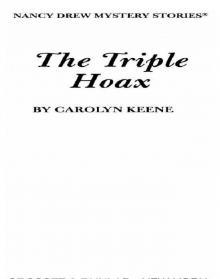 The Triple Hoax
The Triple Hoax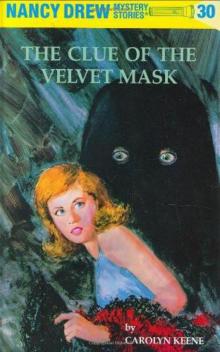 The Clue of the Velvet Mask
The Clue of the Velvet Mask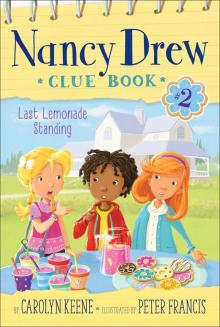 Last Lemonade Standing
Last Lemonade Standing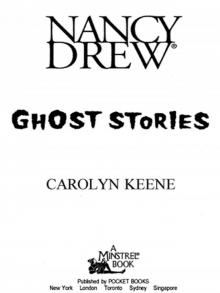 The Ghost of Blackwood Hall
The Ghost of Blackwood Hall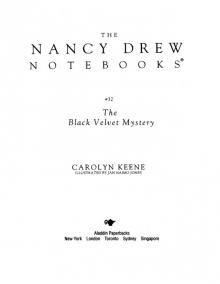 The Black Velvet Mystery
The Black Velvet Mystery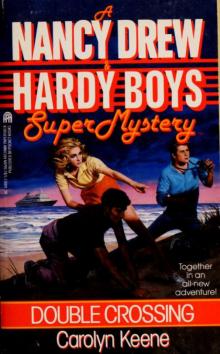 Double Crossing
Double Crossing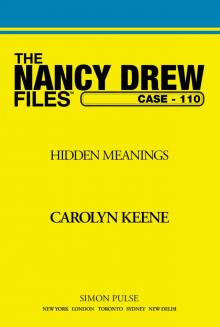 Hidden Meanings
Hidden Meanings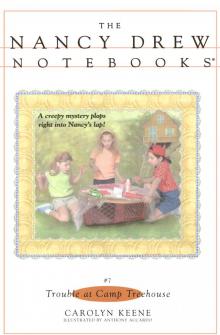 Trouble at Camp Treehouse
Trouble at Camp Treehouse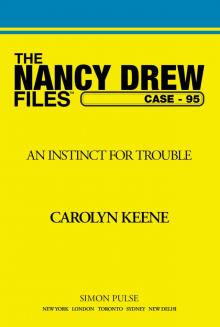 An Instinct for Trouble
An Instinct for Trouble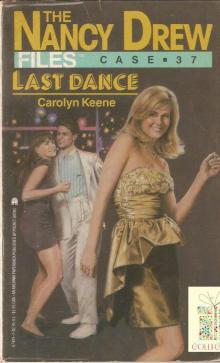 037 Last Dance
037 Last Dance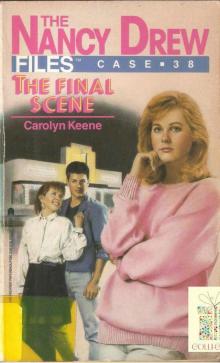 038 The Final Scene
038 The Final Scene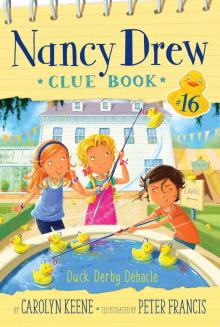 Duck Derby Debacle
Duck Derby Debacle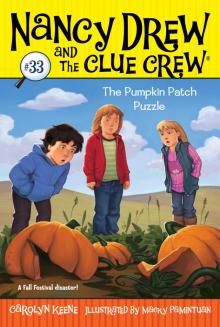 The Pumpkin Patch Puzzle
The Pumpkin Patch Puzzle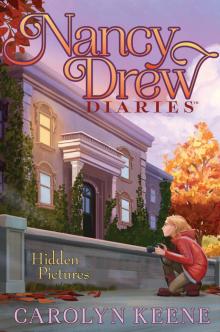 Hidden Pictures
Hidden Pictures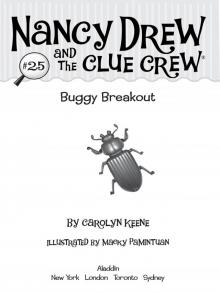 Buggy Breakout
Buggy Breakout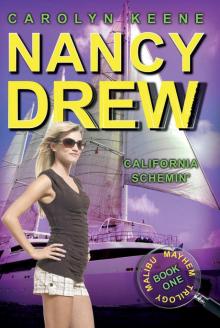 California Schemin'
California Schemin'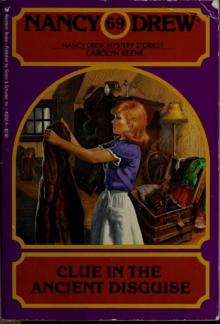 Clue in the Ancient Disguise
Clue in the Ancient Disguise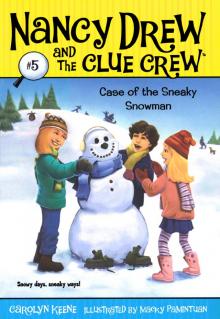 Case of the Sneaky Snowman
Case of the Sneaky Snowman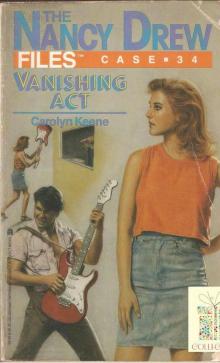 034 Vanishing Act
034 Vanishing Act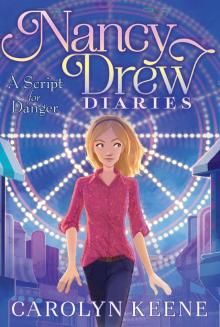 A Script for Danger
A Script for Danger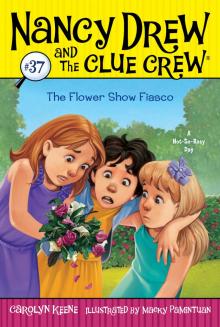 The Flower Show Fiasco
The Flower Show Fiasco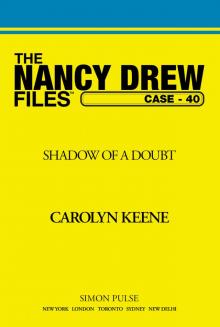 Shadow of a Doubt
Shadow of a Doubt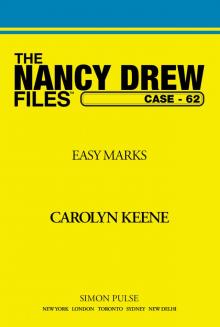 Easy Marks
Easy Marks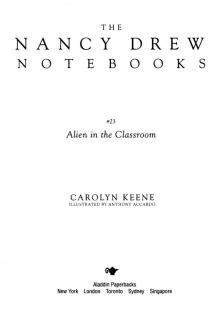 Alien in the Classroom
Alien in the Classroom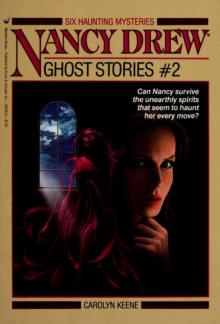 Ghost Stories, #2 (Nancy Drew)
Ghost Stories, #2 (Nancy Drew)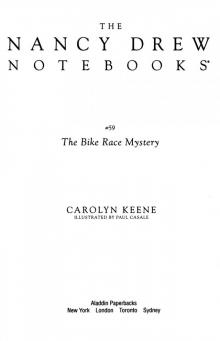 The Bike Race Mystery
The Bike Race Mystery False Pretenses
False Pretenses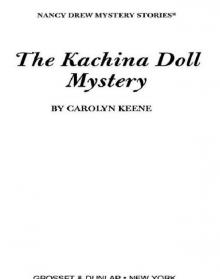 The Kachina Doll Mystery
The Kachina Doll Mystery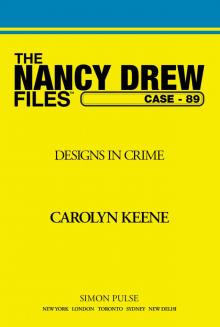 Designs in Crime
Designs in Crime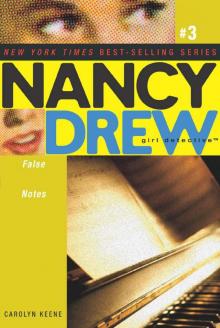 False Notes
False Notes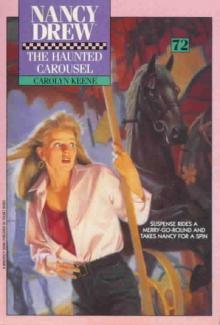 The Haunted Carousel
The Haunted Carousel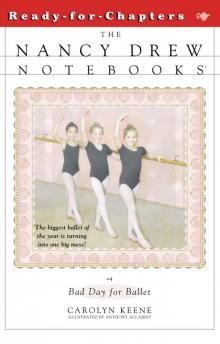 Bad Day for Ballet
Bad Day for Ballet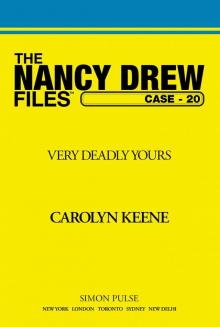 Very Deadly Yours
Very Deadly Yours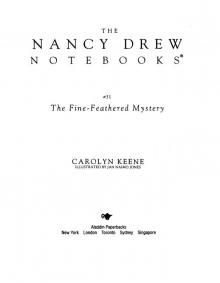 The Fine-Feathered Mystery
The Fine-Feathered Mystery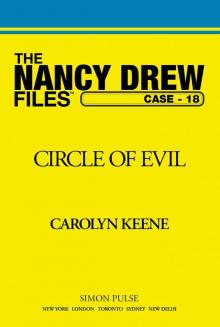 Circle of Evil
Circle of Evil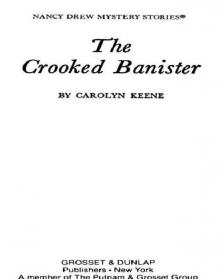 The Crooked Banister
The Crooked Banister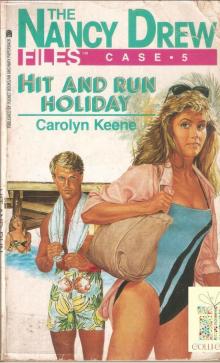 005 Hit and Run Holiday
005 Hit and Run Holiday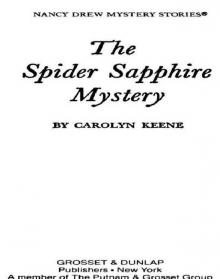 The Spider Sapphire Mystery
The Spider Sapphire Mystery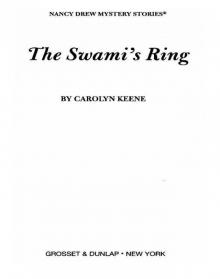 The Swami's Ring
The Swami's Ring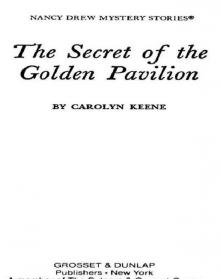 The Secret of the Golden Pavilion
The Secret of the Golden Pavilion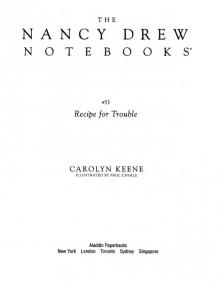 Recipe for Trouble
Recipe for Trouble Betrayed by Love
Betrayed by Love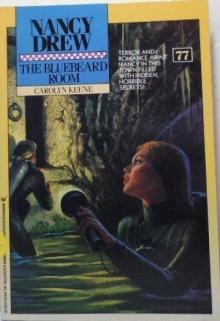 The Bluebeard Room
The Bluebeard Room Sweet Revenge
Sweet Revenge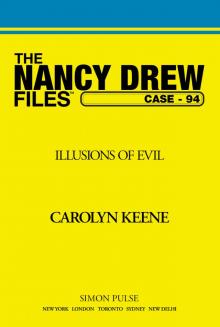 Illusions of Evil
Illusions of Evil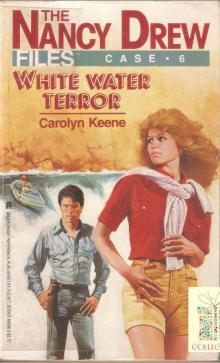 006 White Water Terror
006 White Water Terror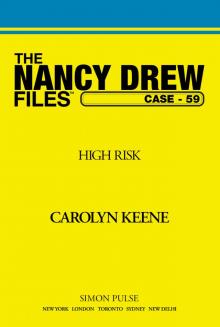 High Risk
High Risk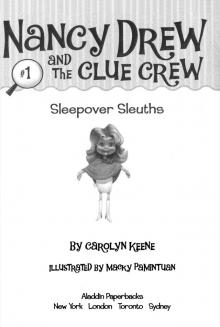 Sleepover Sleuths
Sleepover Sleuths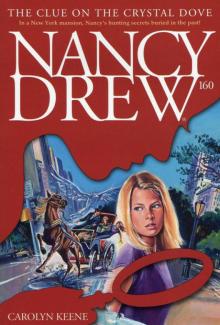 The Clue on the Crystal Dove
The Clue on the Crystal Dove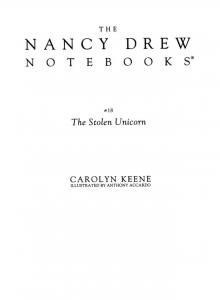 The Stolen Unicorn
The Stolen Unicorn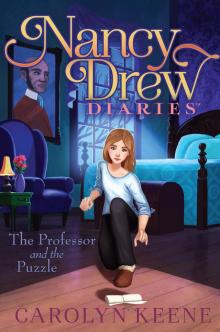 The Professor and the Puzzle
The Professor and the Puzzle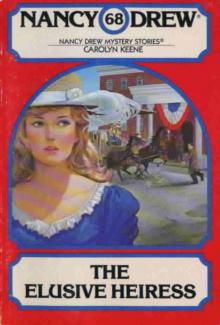 The Elusive Heiress
The Elusive Heiress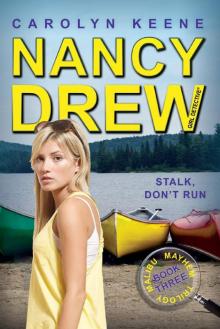 Stalk, Don't Run
Stalk, Don't Run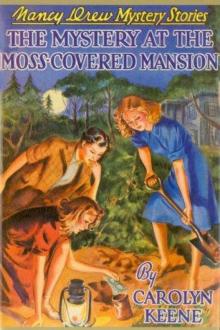 The Mystery at the Moss-Covered Mansion
The Mystery at the Moss-Covered Mansion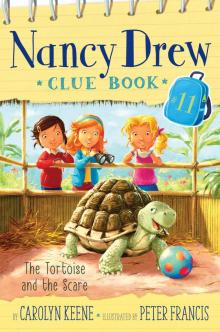 The Tortoise and the Scare
The Tortoise and the Scare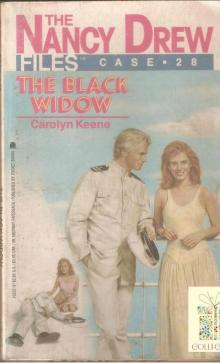 028 The Black Widow
028 The Black Widow Big Worry in Wonderland
Big Worry in Wonderland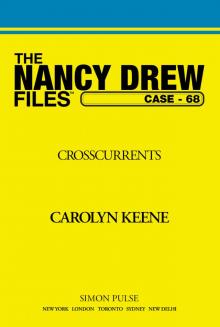 Crosscurrents
Crosscurrents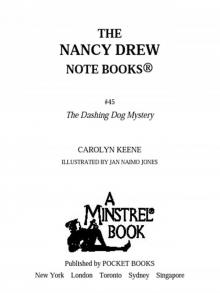 The Dashing Dog Mystery
The Dashing Dog Mystery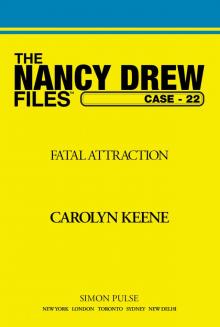 Fatal Attraction
Fatal Attraction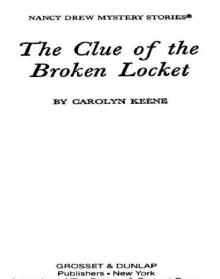 The Clue of the Broken Locket
The Clue of the Broken Locket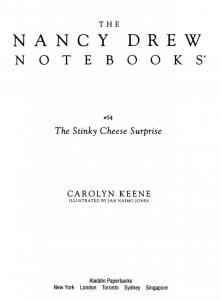 The Stinky Cheese Surprise
The Stinky Cheese Surprise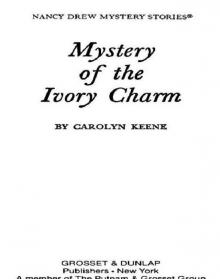 Mystery of the Ivory Charm
Mystery of the Ivory Charm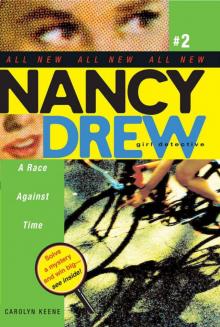 A Race Against Time
A Race Against Time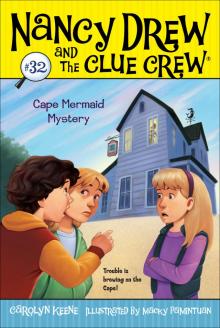 Cape Mermaid Mystery
Cape Mermaid Mystery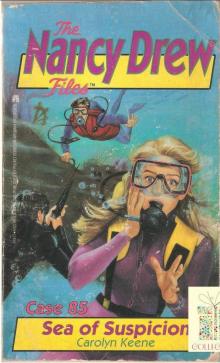 085 Sea of Suspicion
085 Sea of Suspicion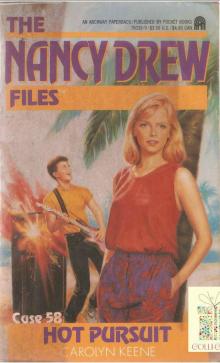 058 Hot Pursuit
058 Hot Pursuit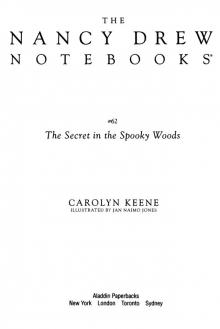 The Secret in the Spooky Woods
The Secret in the Spooky Woods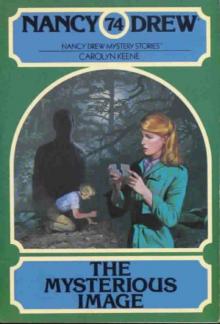 The Mysterious Image
The Mysterious Image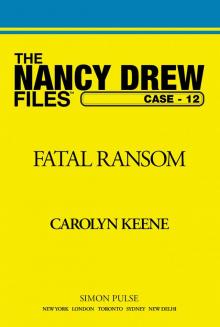 Fatal Ransom
Fatal Ransom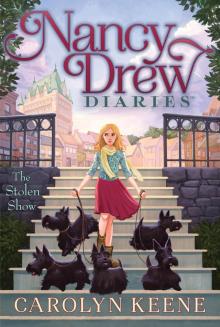 The Stolen Show
The Stolen Show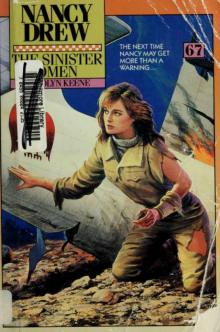 The Sinister Omen
The Sinister Omen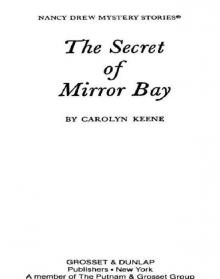 The Secret of Mirror Bay
The Secret of Mirror Bay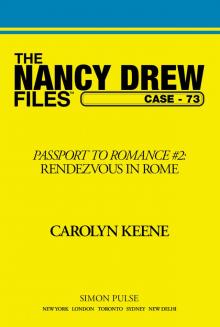 Rendezvous in Rome
Rendezvous in Rome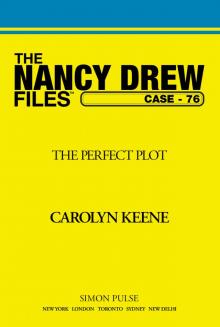 The Perfect Plot
The Perfect Plot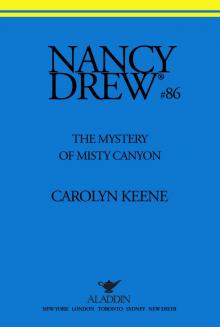 The Mystery of Misty Canyon
The Mystery of Misty Canyon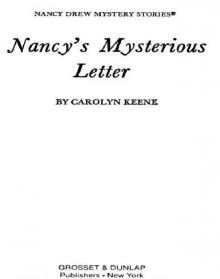 Nancy's Mysterious Letter
Nancy's Mysterious Letter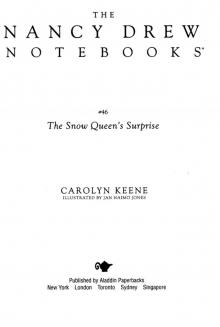 The Snow Queen's Surprise
The Snow Queen's Surprise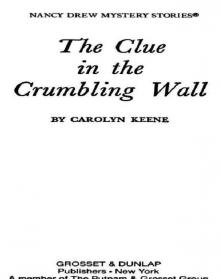 The Clue in the Crumbling Wall
The Clue in the Crumbling Wall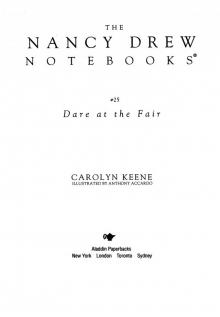 Dare at the Fair
Dare at the Fair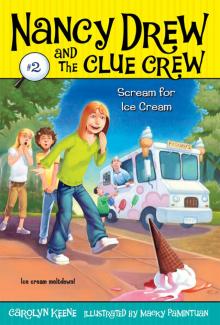 Scream for Ice Cream
Scream for Ice Cream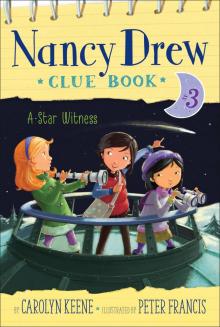 A Star Witness
A Star Witness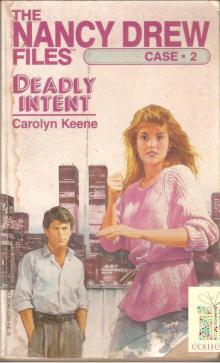 002 Deadly Intent
002 Deadly Intent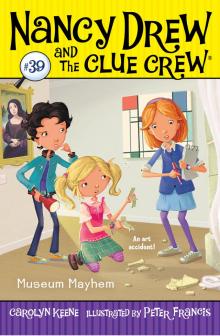 Museum Mayhem
Museum Mayhem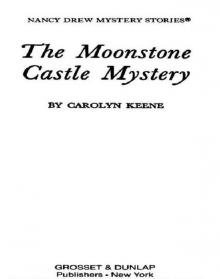 The Moonstone Castle Mystery
The Moonstone Castle Mystery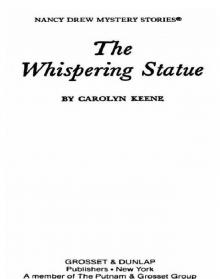 The Whispering Statue
The Whispering Statue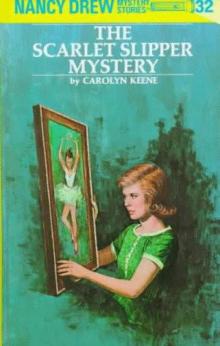 The Scarlet Slipper Mystery
The Scarlet Slipper Mystery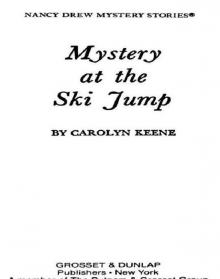 Mystery at the Ski Jump
Mystery at the Ski Jump Hot Pursuit
Hot Pursuit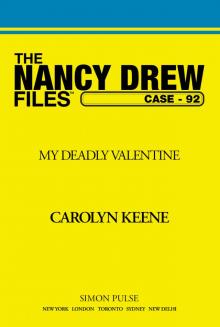 My Deadly Valentine
My Deadly Valentine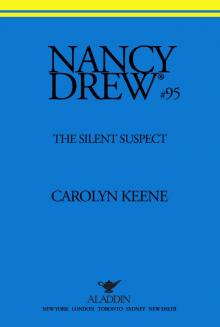 The Silent Suspect
The Silent Suspect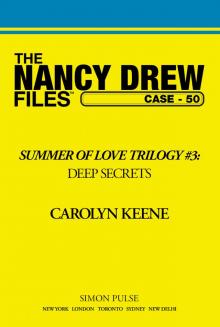 Deep Secrets
Deep Secrets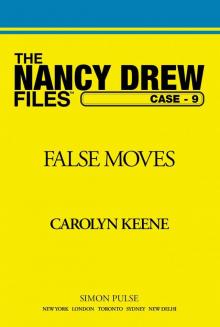 False Moves
False Moves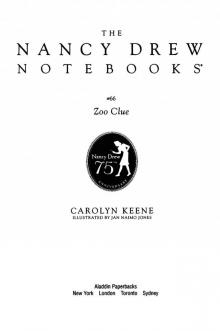 The Zoo Crew
The Zoo Crew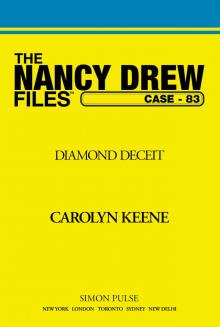 Diamond Deceit
Diamond Deceit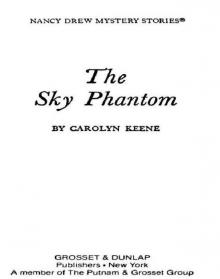 The Sky Phantom
The Sky Phantom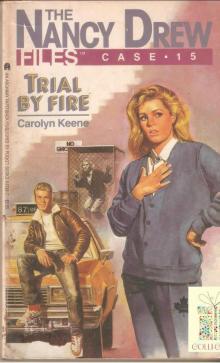 015 Trial by Fire
015 Trial by Fire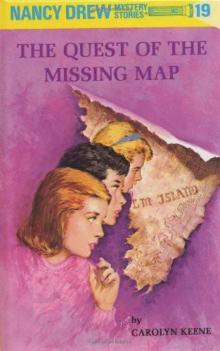 The Quest of the Missing Map
The Quest of the Missing Map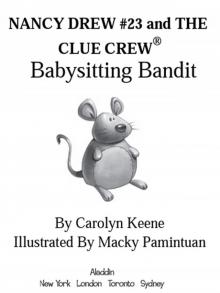 Babysitting Bandit
Babysitting Bandit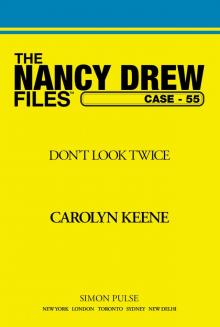 Don't Look Twice
Don't Look Twice Never Say Die
Never Say Die The Soccer Shoe Clue
The Soccer Shoe Clue Pool Party Puzzler
Pool Party Puzzler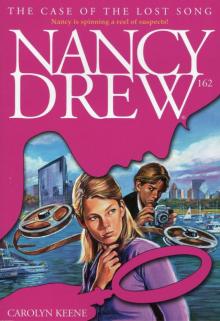 The Case of the Lost Song
The Case of the Lost Song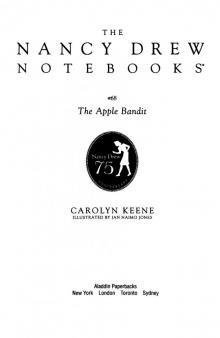 The Apple Bandit
The Apple Bandit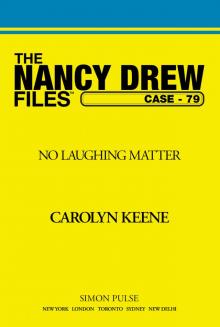 No Laughing Matter
No Laughing Matter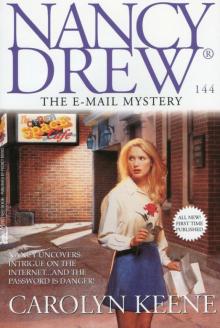 The Thirteenth Pearl
The Thirteenth Pearl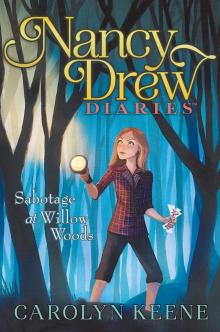 Sabotage at Willow Woods
Sabotage at Willow Woods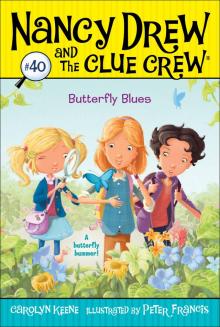 Butterfly Blues
Butterfly Blues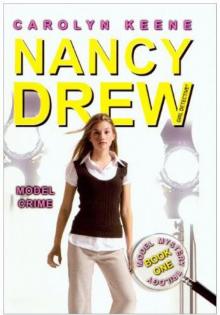 Model Crime 1
Model Crime 1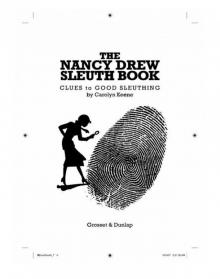 The Nancy Drew Sleuth Book
The Nancy Drew Sleuth Book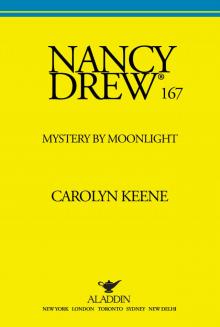 Mystery by Moonlight
Mystery by Moonlight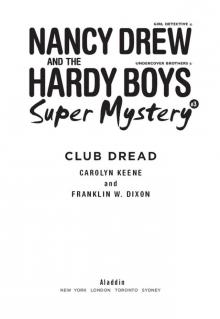 Club Dread
Club Dread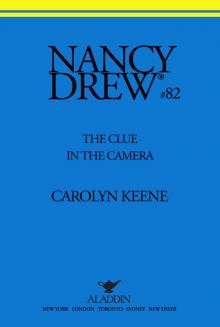 The Clue in the Camera
The Clue in the Camera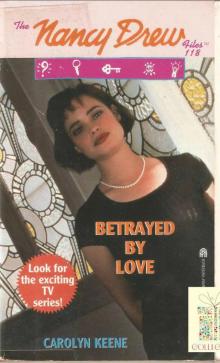 118 Betrayed By Love
118 Betrayed By Love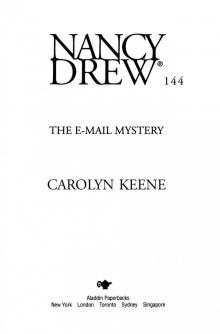 The E-Mail Mystery (Nancy Drew Book 144)
The E-Mail Mystery (Nancy Drew Book 144)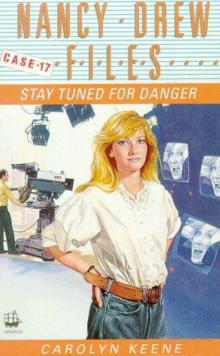 Stay Tuned for Danger: Circle of Evil
Stay Tuned for Danger: Circle of Evil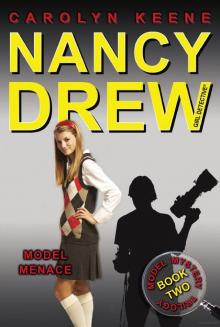 Model Menace 2
Model Menace 2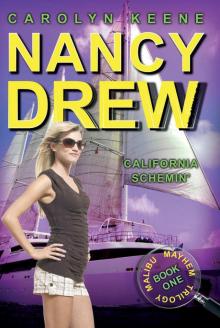 California Schemin': Book One in the Malibu Mayhem Trilogy
California Schemin': Book One in the Malibu Mayhem Trilogy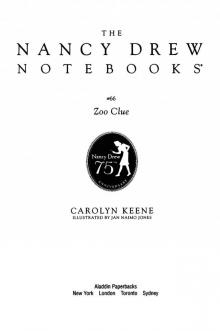 Zoo Clue (Nancy Drew Notebooks)
Zoo Clue (Nancy Drew Notebooks)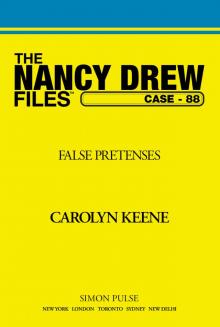 False Pretences
False Pretences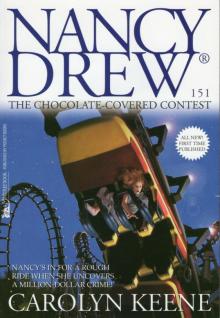 151 The Chocolate-Covered Contest
151 The Chocolate-Covered Contest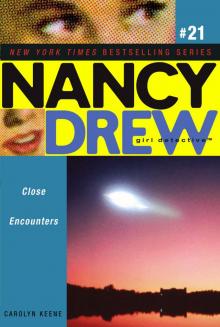 Close Encounters
Close Encounters The Emeral-Eyed Cat Mystery
The Emeral-Eyed Cat Mystery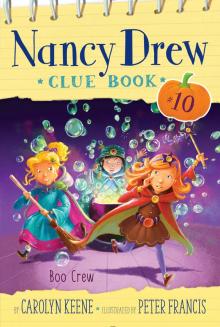 Boo Crew
Boo Crew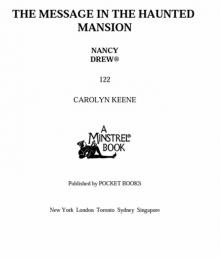 The Message in the Haunted Mansion (Nancy Drew Book 122)
The Message in the Haunted Mansion (Nancy Drew Book 122)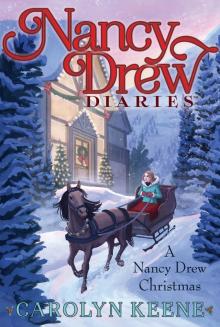 A Nancy Drew Christmas
A Nancy Drew Christmas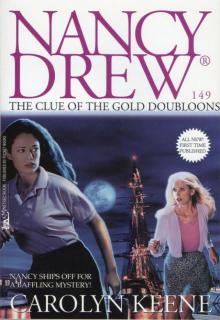 149 The Clue Of The Gold Doubloons
149 The Clue Of The Gold Doubloons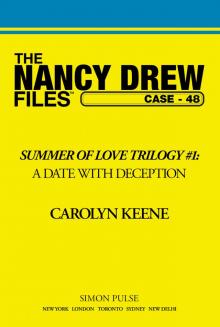 A Date with Deception
A Date with Deception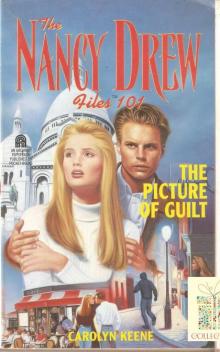 101 The Picture of Guilt
101 The Picture of Guilt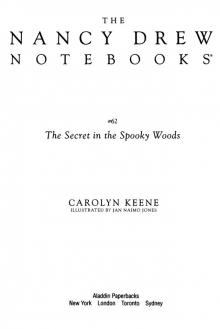 The Secret in the Spooky Woods (Nancy Drew Notebooks Book 62)
The Secret in the Spooky Woods (Nancy Drew Notebooks Book 62)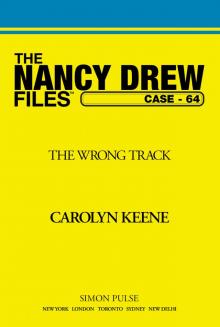 The Wrong Track
The Wrong Track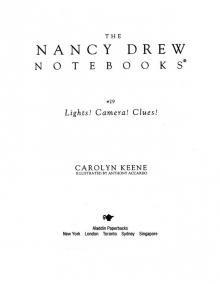 Lights! Camera! Clues!
Lights! Camera! Clues!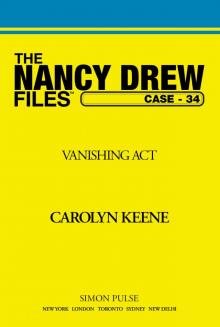 The Vanishing Act
The Vanishing Act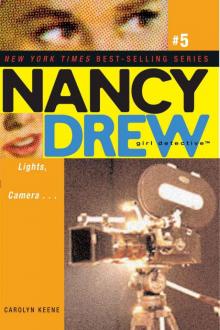 Lights, Camera . . .
Lights, Camera . . .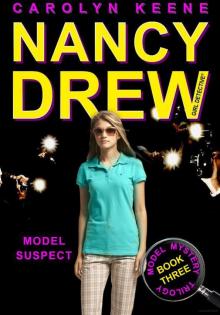 Model Suspect 3
Model Suspect 3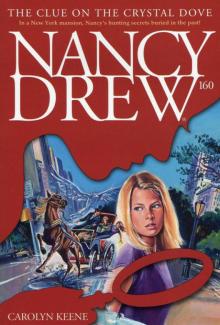 160 The Clue On The Crystal Dove
160 The Clue On The Crystal Dove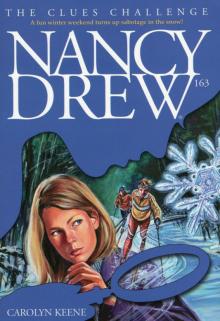 163 The Clues Challenge
163 The Clues Challenge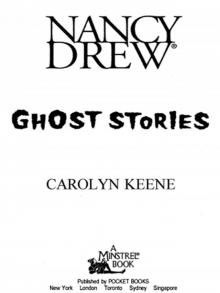 Ghost Stories (Nancy Drew)
Ghost Stories (Nancy Drew)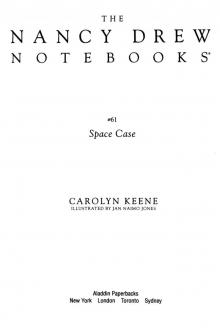 Space Case (Nancy Drew Notebooks Book 61)
Space Case (Nancy Drew Notebooks Book 61)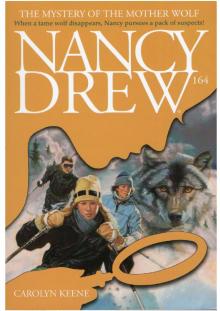 164 The Mystery Of The Mother Wolf
164 The Mystery Of The Mother Wolf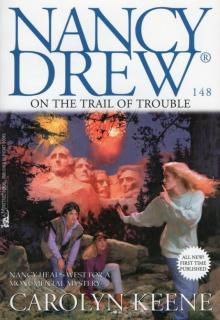 148 On The Trail Of Trouble
148 On The Trail Of Trouble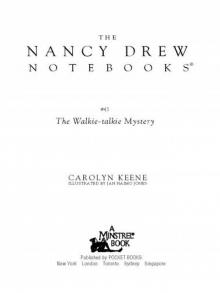 The Walkie-Talkie Mystery
The Walkie-Talkie Mystery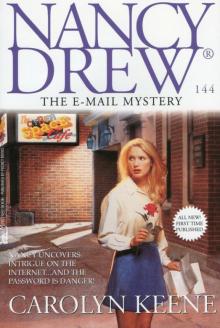 The E-Mail Mystery
The E-Mail Mystery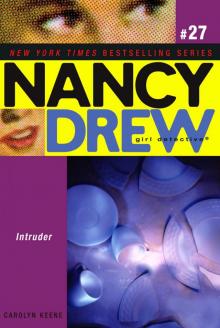 Intruder (Nancy Drew (All New) Girl Detective)
Intruder (Nancy Drew (All New) Girl Detective)![The Stolen Relic [Nancy Drew Girl Detective 007] Read online](http://i1.bookreadfree.com/i2/04/11/the_stolen_relic_nancy_drew_girl_detective_007_preview.jpg) The Stolen Relic [Nancy Drew Girl Detective 007]
The Stolen Relic [Nancy Drew Girl Detective 007]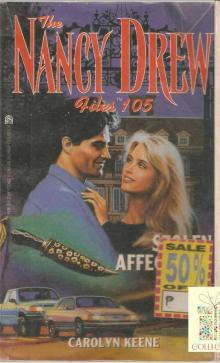 105 Stolen Affections
105 Stolen Affections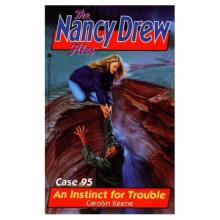 An Instict for Trouble
An Instict for Trouble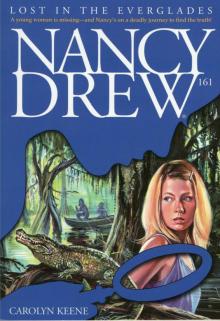 161 Lost In The Everglades
161 Lost In The Everglades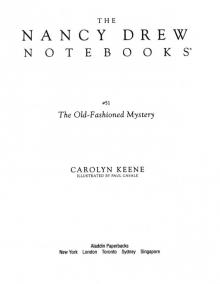 The Old-Fashioned Mystery
The Old-Fashioned Mystery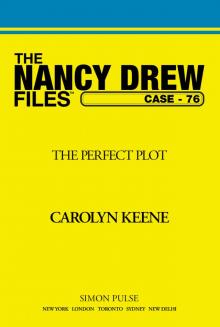 Perfect Plot
Perfect Plot